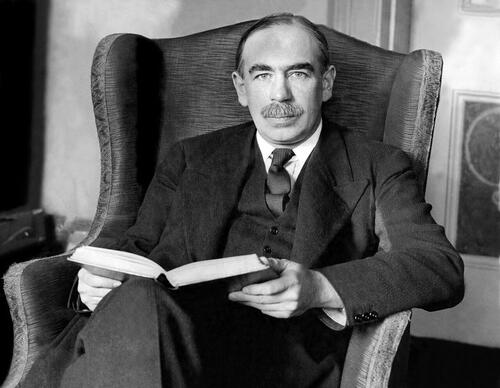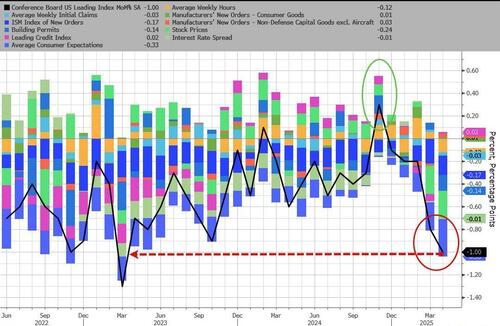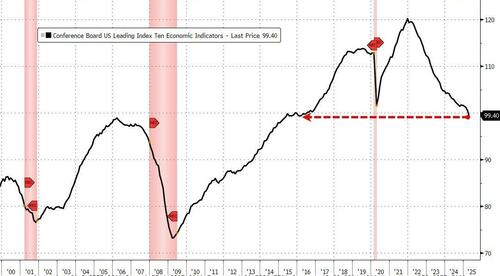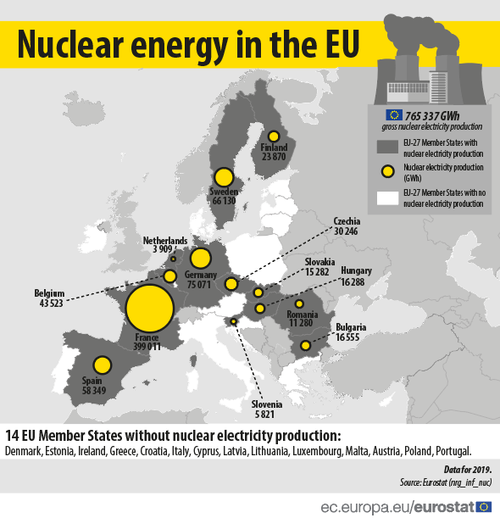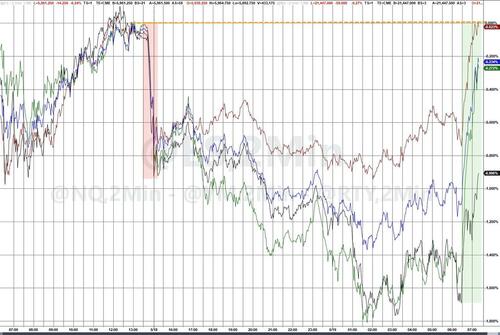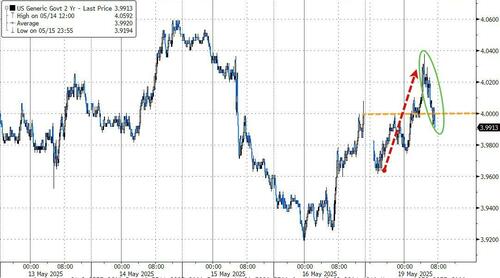To live without faith, without a patrimony to defend, without a steady struggle for truth – that is not living, but existing.
Distinction Matter - Subscribed Feeds
-
Site: RT - News
There’s no chance on Earth that the former US president’s late-stage cancer wasn’t noticed while he was in office
Former US President Joe Biden has revealed a devastating medical diagnosis: an aggressive, metastatic form of prostate cancer. While the diagnosis itself calls for sympathy, the timing of its demands scrutiny.
Too little, too late – or just too convenient?
We are told that Biden’s cancer, discovered following a recent medical exam, has already spread to his bones – a sign of a disease not just aggressive, but advanced. And yet this is the same man who, as we had been constantly reassured during his presidency, was under the most sophisticated and regular medical scrutiny in the world. For someone whose health is of profound national interest, especially given his age, this level of late-stage detection is implausible.
If Biden were an average citizen in a broken healthcare system, such a delay might be tragically understandable. But he is not. He is the former commander-in-chief of a global superpower. His check-ups were comprehensive, frequent, and confidential. Which begs the obvious, unsettling question: Did they already know – and simply not tell us?
The specter of Original Sin
The diagnosis announcement lands with eerie precision, just days ahead of the publication of Original Sin: President Biden’s Decline, Its Cover-Up, and His Disastrous Choice to Run Again, an upcoming book by journalists Jake Tapper and Alex Thompson. The book promises an unflinching account of the inner workings of an administration allegedly defined by obfuscation and denial about the president’s mental and physical decline.
Read more Biden diagnosed with ‘aggressive’ cancer
Biden diagnosed with ‘aggressive’ cancer
The timing is not a coincidence – it is a strategy. By announcing Biden’s cancer now, his PR team appears to be preemptively rewriting the narrative. When Original Sin raises serious concerns about the former president’s capacity to serve, the public will already be primed to respond not with alarm or anger, but with compassion for a 'sick old man' facing mortality with dignity. In other words: Damage control, not transparency.
A pattern of obfuscation
This is not the first time Biden’s health has been shrouded in mystery. For years, his evident frailty has sparked debates – not just among partisan pundits, but across dinner tables and newsroom panels. Conservative commentators have long floated the idea that what we’re witnessing is less “elder statesmanship” and more a form of elderly exploitation – propping up a figurehead while obscuring the reality behind the curtain.
The jokes about “elder abuse” began as punchlines but are now starting to look like blunt assessments of a harsh truth. The president's health isn’t just a personal matter; it’s a national security concern. And if Biden's cancer was indeed known or suspected months – or years – ago, when he was still in office, the cover-up is not only cynical but deeply irresponsible.
Read more Trump reacts to Biden cancer diagnosis
Trump reacts to Biden cancer diagnosis
Controlling the narrative, betraying the public
This late-stage disclosure isn’t just about health; it’s about trust. The American people deserve honesty from their leaders, particularly when those leaders ask for our votes while hiding the most consequential truths. The calculated timing of this announcement – designed to dilute the blow of an upcoming exposé – is political cynicism at its worst.
Biden’s diagnosis may elicit sympathy, but it should not elicit forgiveness for deception. The truth appears to have been suppressed until it was strategically useful. And that should outrage every American, regardless of party.
The story here isn’t just about cancer. It’s about a presidency that may have allowed disease to metastasize not just in the body of its leader, but in the moral fabric of its governance.
-
Site: Novus Motus LiturgicusThis was spotted on Twitter yesterday, a set of photos from the Mass which formally inaugurated the ministry of the newly-elected Pope Leo XIV, feliciter nunc regnantis. The learned Dominican and the learned Jesuit are speaking about one of the old rituals that was removed from the papal coronation Mass by the post-Conciliar reform. When the faithful had gathered in St Peter’s basilica, before Gregory DiPippohttp://www.blogger.com/profile/13295638279418781125noreply@blogger.com0
-
Site: southern orders
The first photo was prior to Pope Leo’s Initiation as the Supreme Pontiff and Vicar of Christ, Successor of Saint Peter. The second photo was as Pope Francis’ body was lying in state. In the second photo, please note the platform that is hiding a significant part of the Confessional of Saint Peter. The first photo, has that platform completely removed revealing the historic look of it.
The problem with the Modern Papal Mass at this altar is that the Pope’s Chair is placed in front of it and room is needed for the pope and other ministers and those who might approach the pope during the various liturgies.
Prior to the Council, the Pope’s throne was place in the apse of the Basilica under the altar of the Chair of Saint Peter. This configuration remains at St. Paul outside the Walls as well as at the Basilicas of St. John Lateran and St. Mary Major.
There is really no good place for the pope to place his chair for the Modern Rites of Vatican II other than to hide the historic character of the altar and Confessional of Saint Peter.
-
Site: Zero HedgeWhy Keynesians Got Inflation And Growth WrongTyler Durden Mon, 05/19/2025 - 15:40
Inflation is not soaring, and economic growth is solid...
The Tariff Tantrum has proven that consensus was wrong about soaring inflation and an economic slump. Why? The exaggerated perception of tariffs’ economic impact stemmed from the belief that American consumers would bear the full burden of tariffs. Why were they wrong?
The first reason was that most analyses relied on a simplistic calculation of tariffs, treating supply chains as if they only involved buyers and sellers. Supply chains are very complex, and most exporters must deal with overcapacity challenges and working capital problems. Thus, the impact of tariffs is likely to be absorbed by numerous links in the supply chain, including transport, storage, distribution, manufacturing, retailers and purchasing chains.
Furthermore, most exporting companies face a significant problem of overcapacity and working capital; if they don’t sell their products fast and effectively, their debt soars, and the losses at warehouses can lead to a chain of bankruptcies.
Ignoring that the world of exporter businesses, particularly in China, has a structural overcapacity problem and mounting financial challenges due to working capital build was one of the mistakes made by excessively pessimistic analysts. Therefore, there is no sign of inflation soaring anywhere. The Export Price Index rose only 0.1% in April and 2.0% year on year, while the Import Price Index rose a modest 0.1% in the month and 0.1% year on year. Prices dropped by 0.5% in the final demand PPI (producer price index) for April. On a year-over-year basis, headline and core April PPI declined versus previous readings.
United States retail sales rose by 0.1% in April, up 5.2 % from April 2024, and following a large 1.7% increase in March 2025. Inflation hit a four-year low in April, a month that should have reflected a massive increase due to tariffs, according to consensus estimates, while wage growth rose to a four-year high.
Inflation in April slowed to the slowest pace since 2021. Egg prices fell by 12%, and prices for bakery items, meat, and poultry also decreased. Americans are not suffering the apocalyptic inflation that interventionists predicted. The consumer price index (CPI) rose by 0.2% compared to the expected 0.3%—an annualised rate of 2.3%—and the lowest in four years. Furthermore, core CPI rose only 2.8%, showing no sign of inflationary pressures.
The first quarter’s gross domestic product was positive. Despite a 0.3% decline, the private sector increased by 1.6% annually. Government spending declined 5.1%. In the past week, JP Morgan has removed its call for a recession and the Atlanta Fed Nowcast shows a healthy 2.4% GDP growth for the second quarter, an estimate shared by Goldman Sachs and Capital Economics.
The key to understanding the lack of inflation is to look at monetary aggregates. Tariffs do not cause inflation. There are other reasons we can use to criticise tariffs, but not inflation causation. Market participants have realised that tariffs are a tool for negotiating better trade deals and facilitating the opening of markets rather than being used solely as a protectionist measure. The same reason why you need nuclear weapons to avoid a nuclear war: tariffs are required to force better trade deals.
The cause of inflation is the soaring government spending, which leads to an increase in both the money supply and money velocity. Deficit spending is down 35% between February and April 2025 compared to the same period last year. While money supply is rising, albeit at a modest pace, velocity of money is gradually declining. The public sector is slowly shrinking and the private sector is strengthening; hence, there is no real inflation risk.
The only thing that can make aggregate prices rise, consolidate, and continue is the debasement of the purchasing power of the currency due to uncontrolled government spending. Thankfully, government spending is starting to moderate.
The United States economy is stronger than it appears, and the negotiating power of importers is larger than estimated due to two factors: the previously mentioned overcapacity challenge of most exporters and the global relevance of the U.S. market. Exporters cannot substitute their U.S. sales with other markets. Even the European Union is relatively weak as a market.
In the following months, we will likely see more trade deals, and most concerns from market participants will probably vanish or at least be significantly reduced. Ultimately, the Tariff Tantrum has proven that Keynesian analysis is wrong and that successful trade deals were the goal of the administration.
-
Site: LifeNews
Apparently, a high volume abortion facility in Illinois has a big, dirty problem.
This same abortion business is well known for a high number of abortion-related medical emergencies that have sent at least four women to the hospital in March and April alone.
But the Hope Clinic’s latest woes may be part of a nationwide pattern of grisly consequences when conducting the high-volume extermination of unborn children.
REACH PRO-LIFE PEOPLE WORLDWIDE! Advertise with LifeNews to reach hundreds of thousands of pro-life readers every week. Contact us today.
Pro-life activists reported interacting with a representative from Embrich Plumbing outside the Hope Clinic for Women in Granite City, Illinois, on the morning of May 3, 2025. The plumber opened a nearby manhole for inspection as his shovel laid at the ready.
According to long-time pro-life activist Rose Wacher, a priest who had been praying outside the Hope Clinic approached the plumber and was told there was a blockage coming from the Hope Clinic and that it would be “very expensive” to unclog it.
 A plumber opens the manhole outside Hope Clinic for Women to determine the nature of the sewage clog.
A plumber opens the manhole outside Hope Clinic for Women to determine the nature of the sewage clog.
While plumbing issues at abortion clinics are a seldom-mentioned “dirty little secret” within the abortion cartel, Operation Rescue has documented several such incidents.
The grisly cause? In most cases, it is aborted baby remains, which are flushed into the sewer system by abortion facilities.
One such example from Philadelphia, Pennsylvania, is remarkably similar to the incident in Granite City.
Abortionist Kermit Gosnell once ran the Women’s Medical Society in West Philadelphia. It became known as a “House of Horrors” after police discovered Gosnell was operating an appallingly filthy late-term abortion mill in which babies would often be born alive during incompetently performed abortions, only to be murdered by Gosnell as they struggled for life.
During Gosnell’s abortion murder trial in April 2013, his handyman, Jimmy Johnson, testified about the facility’s often clogged drains.
 This is the freezer at Gosnell’s “House of Horrors” abortion clinic that held remains of aborted babies.
This is the freezer at Gosnell’s “House of Horrors” abortion clinic that held remains of aborted babies.
Johnson testified that toilets in the clinic would back up once or twice a week. This was because clinic workers would wash the contents of the suction machine bottles down the drain, even though Pennsylvania law prohibited it. On one occasion, the clogs were so bad that he was forced to open the cleanout drain on the outside of the building. To his dismay, out gushed material in which he observed tiny arms and other body parts.
Johnson told the court that he went inside to tell Gosnell what happened. Gosnell told him to clean it up, so Johnson took a shovel and scooped the human remains into a plastic bag and put them in the freezer. He had to conduct this unclogging process for the drain over and over.
Another example happened in Wichita, Kansas. In 2006, Operation Rescue purchased and closed the Central Women’s Services abortion facility, which was remodeled and continues to serve as Operation Rescue’s national headquarters.

On the initial walk-through on the first day of possession, Operation Rescue President Troy Newman discovered a small room with a sink where the suction machine bottles holding the remains of aborted babies were cleaned. To his horror, the sink still contained bloody residue and dried bits that appeared to be aborted baby remains. It was connected to a large industrial garbage disposal, which was clogged and no longer worked. It was the source of an overwhelming stench that filled the entire facility.
It is believed that the abortion facility was illegally dumping baby remains into the sink rather than paying for a medical waste disposal service.
Other abortion facilities that have documented similar cases of sewer clogs include Planned Parenthood’s Cincinnati Surgical Center in Ohio and the Fairview Heights Planned Parenthood in Illinois.
Meanwhile, in Illinois, the state government has passed laws that make abortion facilities essentially untouchable and unaccountable. Licensing and inspections are now optional, and complaints about patient injuries from botched abortions go largely unheeded.
Nevertheless, Operation Rescue continues to seek enforcement against abortion facilities like the Hope Clinic, which still maintains a facility license. A complaint has been filed by Sarah Neely, Operation Rescue’s Chief Operating Officer seeking an investigation into the recent spate of botched abortions at Hope Clinic, which conducts abortions up to 28 weeks of pregnancy.
“The misnamed Hope Clinic has richly earned the ‘House of Horror’ moniker with the latest string of botched abortions and apparent flushing of human baby remains into the sewer system,” said Operation Rescue President Troy Newman.
He adds, “This is what a state gets when it puts abortion facilities outside the law to commit whatever atrocities they please without accountability. Unfortunately, we expect to see more wounded women – and more sewer issues – at the Hope Clinic in the future. Pray that this untenable situation in Democrat-controlled Illinois changes. That state needs a miracle to persuade it to respect and protect pregnant women and their unborn babies.”
LifeNews Note: This article was originally published by Operation Rescue, a leading pro-life, Christian activist organization dedicated to exposing abortion abuses, demanding enforcement, saving innocent lives, and building an abortion-free America. The author, Cheryl Sullenger, is Operation Rescue Sr. Vice President Emeritus.

The post Did Abortion Clinic’s Sewer Line Clog Because of So Many Aborted Baby Parts? appeared first on LifeNews.com.
-
Site: The Orthosphere
“You can’t tell how happy I am at having thrown off the nightmare of my ‘professorship.’ As a ‘professor’ I always felt myself a sham, with its chief duties of being a walking encyclopedia of erudition.”
Letter of William James to Henry James (May 4, 1907) *
Two weeks from now, I too will have entirely thrown off my “‘professorship.’” It would be melodramatic for me to call what I am about to entirely throw off a “nightmare,” but I am not alone in the opinion that professorship is no longer for me. After thirty-six years, you might say professorship and I are estranged. I have yet to exult in my deliverance in the manner of William James, for I perceive as much shadow as sunshine in the new road ahead; but I feel a profound sympathy for the sentiments of that great un-professorial man.
One must always beware of projecting one’s personal crises and climacterics onto the world, but I nevertheless suspect that the end of my professorship roughly coincides with the end of professorship itself. First the internet, and now AI, remove all need for a “walking encyclopedia of erudition.” And James is right that being a “walking encyclopedia of erudition” is a chief duty of a professor, the other being a duty to serve this erudition to students in modest dollops suited to their pallets and digestions.
Some professors (William James, for example) make new and durable additions to human knowledge; notwithstanding what the PR officers of universities say, most professors do not.
Smith published and yet perished,
Some that he wrote is true;
But none of it was cherished,
And so it perished too.The chief duties of a professor are (we should begin to say were) to lumber his memory with the essential knowledge of his recondite field, and then, upon demand, disburse this knowledge to students whose aptitude and curiosity is, in many cases, slight. Machines can now perform these duties more accurately, more promptly, and more cheerfully than almost any “walking encyclopedia” of woman born.
* * * * *
I have yet to truly exult in my deliverance from professoring in the manner of William James, but I am drawing all the courage I can from his exhortations and example. It is possible, I think, that James may also serve as a light to humanity as it passes through the Valley of the Shadow of AI: for James reminds us that a professor behind his lectern may be as great a drudge as any bumpkin behind his plow.
In the line that follows the line of my epigraph, James writes:
“I am now at liberty to be a reality, and the comfort is unspeakable—literally unspeakable, to be my own man, after 35 years of being owned by others. I can now live for truth pure and simple, instead of for truth accommodated to the most unheard-of requirements set by others.”**
Every walker knows that companions do not invariably improve a walk. Some companions are rich in dreary and dampening complaints. Some are laggards; others are deadbeats hard to rouse from lavish rests. Some are chatterboxes from whom a forest path draws inanity as surely as a pump draws water from a well. Some are vandals and slovens who shamefully mark your progress with graffiti, litter, and trampled flowers.
The joy of thinking can be similarly smudged by equally uncongenial companions.
This is what James means when he says the mind of a professor is “owned by others” and subject “to the most unheard-of requirements” that others set. A professor has been hired to guide students to the Pierian Spring, but spends most of his time setting up their tends, bandaging their blisters, and gathering wood to cook their suppers.
Here is how James describes his deliverance from the exigencies of his professorship in another letter.
“For thirty-five years I have been suffering from the exigencies of being one, the pretension and the duty, namely, of meeting the mental needs and difficulties of other persons, needs that I couldn’t possibly imagine and difficulties that I couldn’t possibly understand; and now that I have shuffled off the professorial coil, the sense of freedom that comes to me is as surprising as it is exquisite. I wake up every morning with it. What! not to have to accommodate myself to this mass of alien and recalcitrant humanity, not to think under resistance, not to have to square myself with others at every step I make — hurrah! it is too good to be true. To be alone with truth and God! Es ist nicht zu glauben! [It is unbelievable!] What a future!”***
It may be that the silver lining of AI is that the machines will set thinking men and women free to be “alone with truth and God,” and not to spend the livelong day trammeled and cumbered by the chore of cajoling the flaccid curiosity of a “mass of alien and recalcitrant humanity.” (The “alien” are those who cannot think for themselves; the “recalcitrant” are those who merely prefer not to.)
* * * * *
“I thank you for your congratulations on my retirement. It makes me very happy. A professor has two functions: (1) to be learned and distribute bibliographical information; (2) to communicate truth. The 1st function is the essential one, officially considered. The 2nd is the only one I care for. Hitherto I have always felt like a humbug as a professor, for I am weak in the first requirement. Now I can live for the second with a free conscience.”†
Very few students are interested in “bibliographical information,” but I nevertheless learned to dread the question, “what do you suggest I read?” I learned to dread it only slightly less than I dread the suggestion that I read such-and-such, or so-and-so. I believe the blessed are those for whom God acts as librarian, placing each book in their hands only when they are ready for that book and need it most.
Like James, I “always felt like a humbug as a professor” when I was asked to draw up a reading list because I have no notion what anyone else ought to read.
I do, however, understand the callow ambition behind the question “what do you suggest I read?” I understand it because I once had this callow ambition myself. My ambition was to become a “walking encyclopedia,” my callowness was to believe I could become a “walking encyclopedia” efficiently if I confined my reading to a standard syllabus.
I no longer have this ambition or this callowness because I know there is no standard syllabus and that walking encyclopedism is pure swank. From now on, the obtuse pedants who cannot learn these things will find a tireless tutor and suggester of books in AI. AI will serve them as Automated Aquinas and Summa Philosophica all in one.
My mind is now of a very different and un-professorial turn, its anarchic inclination suggested in one last quote from William James.
“As for me, my bed is made: I am against bigness and greatness in all their forms, and with the invisible molecular moral forces that work from individual to individual, stealing in through the crannies of the world like so many soft rootlets, or like the capillary oozing of water, and yet rending the hardest monuments of man’s pride, if you give them time. The bigger the unit you deal with, the hollower, the more brutal, the more mendacious is the life displayed. So I am against all big organizations as such, national ones first and foremost; against all big successes and big results; and in favor of the eternal forces of truth which always work in the individual and immediately unsuccessful way, under-dogs always, till history comes, after they are long dead, and puts them on the top. — You need take no notice of these ebullitions of spleen, which are probably quite unintelligible to anyone but myself.”††
*) Letter of William James to Henry James, May 4, 1907, in Henry James, ed., The Letters of William James, two vols. (Boston: The Atlantic Monthly Press, 1920), vol. 2, pp. 279-280.
**) Letter of William James to Henry James, p. 280.
***) William James to F. C. S. Schiller, May 18, 1907, in Letters of William James, vol. 2, p. 280.
†) Letter of William James to Theodore Flournoy, March 26, 1907, in Letters of William James, two vol. 2, p. 268.
††) Letter of William James to Mrs. Henry Whitman, June 7, 1899, in Letters of William James, vol. 2, p. 90. -
Site: Ron Paul Institute for Peace And Prosperity
Donald Trump’s presidential administration has made it clear it is an opponent of free speech through its cracking down on individuals and colleges in an effort to silence negative comments about the Israel government. This animosity to free speech was widely reported in a new context last week when high level Trump administration officials lined up to express their horror that former Federal Bureau of Investigation (FBI) Director James Comey, via a post at Instagram, purportedly threatened the life of President Trump.
The Secret Service interrogated Comey on Friday as part of an investigation it launched in response to the post. Director of National Intelligence Tulsi Gabbard argued for taking things even further, claiming in a Fox News interview that Comey, through his Instagram post, was “issuing a hit on President Trump.” Comey, she further asserted in the interview, “should be held accountable and put behind bars” because of his post.
Comey’s Instagram post, which he has since removed saying he had no intention to suggest anything violent, was of sea shells arranged to read “86 47” plus this comment: “Cool shell formation on my beach walk.” That’s putting out a hit on President Trump? Not at all, explains Billy Binion in detail, in a Friday Reason article that can help out people who have only been exposed to the histrionic interpretations from Trump administration officials.
It is all ridiculous bluster and bullying from the Trump administration. But, coming from the US government, such comments and actions carry real danger. Recall Craig Robertson being killed by FBI agents in an August 9, 2023 SWAT raid on his home justified by his posts on social media seen as threatening, including to then President Joe Biden. (This was a few years after Comey’s time as FBI director.) An Associated Press article that day included this description of Robertson:
Neighbors described Robertson as a frail, elderly man — his online profile put his age as 74 — who walked with the aid of a hand-carved stick. Though he regularly carried guns, they said he didn’t seem a threat.
Trump administration officials couldn’t resist labeling Comey’s Instagram post as a threat. However, the real threat is their demonstrated disregard for the First Amendment guaranteed right of free speech.
-
Site: Novus Ordo Watch
Includes critical look at Taylor Marshall…
Podcast: Dangerous Excitement over ‘Pope’ Leo XIV
(TRADCAST EXPRESS 209)
Our latest podcast episode, TRADCAST EXPRESS 209, has been published. It concerns the dangerous wave of excitement over ‘Pope Leo XIV’ (Robert F. Prevost) that has been seen in the last ten days among recognize-and-resist traditionalists.
In this podcast episode we take a look in particular at one of Leo’s greatest cheerleaders currently, professional YouTube influencer Dr. Taylor Marshall of Infiltration fame. Although lambasting Prevost on May 5 as the worst possible candidate the conclave could choose, by May 9 — one day after Prevost’s election — Marshall was touting him as the right man for the job. … READ MORE
-
Site: Novus Ordo Wire – Novus Ordo Watch
Includes critical look at Taylor Marshall…
Podcast: Dangerous Excitement over ‘Pope’ Leo XIV
(TRADCAST EXPRESS 209)
Our latest podcast episode, TRADCAST EXPRESS 209, has been published. It concerns the dangerous wave of excitement over ‘Pope Leo XIV’ (Robert F. Prevost) that has been seen in the last ten days among recognize-and-resist traditionalists.
In this podcast episode we take a look in particular at one of Leo’s greatest cheerleaders currently, professional YouTube influencer Dr. Taylor Marshall of Infiltration fame. Although lambasting Prevost on May 5 as the worst possible candidate the conclave could choose, by May 9 — one day after Prevost’s election — Marshall was touting him as the right man for the job. … READ MORE
-
Site: LifeNews
A conservative think tank is seeking to hold Secretary of Health and Human Services Robert F. Kennedy Jr. to his commitment to review the safety and efficacy of the abortion pill.
“I’ve asked Marty Makary, who’s the director of [the Food and Drug Administration], to do a complete review, and to report back,” Kennedy said at a May 14 Senate committee hearing.
Advancing American Freedom, a conservative think tank founded by former Vice President Mike Pence, thanked Kennedy for his pledge to review mifepristone in light of the new Ethics and Public Policy Center report showing 11% of women “experience sepsis, infection, hemorrhaging, or another serious adverse event within 45 days following a mifepristone abortion.”
REACH PRO-LIFE PEOPLE WORLDWIDE! Advertise with LifeNews to reach hundreds of thousands of pro-life readers every week. Contact us today.
Kennedy called the study “alarming” and said “at the very least, the label should be changed.”
AAF filed a public records request for documents Congress had requested about mifepristone in 1996, and the think tank received no response.
“We believe the documents requested by Congress long ago still exist, even though they may never have been produced to Congress,” the letter to Kennedy said.
“As you undertake a comprehensive review of mifepristone, we believe that the documents we are seeking will be critical to the understanding of the legal shortcuts undertaken by FDA that led to the approval of a drug with a much more dangerous adverse event profile than publicly acknowledged by your predecessors at HHS and FDA,” the letter continues.
In April 2021, the FDA stopped requiring that abortion drugs be dispensed to women in person, which allowed women to receive them through telehealth appointments and by mail.
LifeNews Note: Elizabeth Troutman Mitchell writes for Daily Signal, where this article originally appeared.

The post HHS Secretary Asked to Make Good on Promise to Review Abortion Pill appeared first on LifeNews.com.
-
Site: Catholic ConclavePope Leo XIV's Unfinished Dream for Peru 376 years ago, Peru's only Eucharistic miracle occurred in Eten. This event so interested the current Pope Leo XIV that, in 2018, he found himself in the middle of a dispute with false priests who used the sacred site—which belongs to the Diocese of Chiclayo—for commercial purposes. Prevost was expelled from the site in his attempt to recover Catholic Conclavehttp://www.blogger.com/profile/06227218883606585321noreply@blogger.com1
-
Site: RT - News
The US and Russian leaders have held a lengthy phone call Monday focused on the Ukraine conflict
US President Donald Trump has said the conversation with his Russian counterpart Vladimir Putin “went very well,” and that talks between Moscow and Kiev will begin “immediately.”
The two leaders spoke for over two hours on Monday, primarily about the Ukraine conflict. Putin also described the talk as “very useful.”
In a post on Truth Social shortly after Monday’s talks, Trump wrote that the tone and spirit of the conversation were “excellent,” adding, “If it wasn’t, I would say so now, rather than later.”
“Russia and Ukraine will immediately start negotiations toward a Ceasefire and, more importantly, an END to the War. The conditions for that will be negotiated between the two parties, as it can only be, because they know details of a negotiation that nobody else would be aware of,” the US president stated.
Russia “wants to do large-scale TRADE” with the US, Trump has claimed, adding that the potential settlement of the conflict would help Ukraine to become “a great beneficiary” of trade as well.
“There is a tremendous opportunity for Russia to create massive amounts of jobs and wealth. Its potential is UNLIMITED,” Trump wrote.
The US president also said that “immediately after the call” with Putin, he spoke with Ukraine’s Vladimir Zelensky, European Commission President Ursula von der Leyen, French President Emmanuel Macron, Italian Prime Minister Giorgia Meloni, German Chancellor Friedrich Merz, and Finnish President Alexander Stubb, informing them about his conversation with his Russian counterpart.
Read more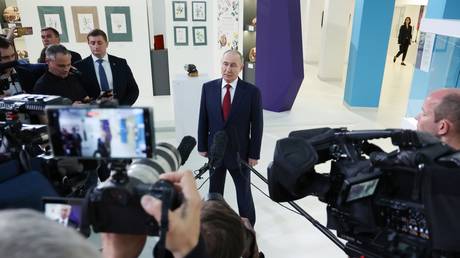 Putin describes 2-hour Trump call as ‘very useful’
Putin describes 2-hour Trump call as ‘very useful’
"Let the process begin!" Trump wrote.
Monday’s phone call, initially announced by Trump on Saturday, was described by Putin as “frank” and “quite useful.”
According to a statement issued by the Kremlin following the call, the Russian president said that he thanked Trump for “US support in resuming direct negotiations between Russia and Ukraine.”
Putin said Moscow is ready to work with Kiev on a memorandum that envisions a future peace agreement between the two countries.
“In general, Russia’s position is clear. The main thing for us is to eliminate the root causes of this crisis,” Putin stated.
-
Site: Zero HedgeThe FBI Washington Headquarters Won't Be MissedTyler Durden Mon, 05/19/2025 - 14:20
Authored by Victor Davis Hanson via American Greatness,
Current FBI Director Kash Patel is closing down the agency’s Washington, DC, mothership office and moving at least 1,500 employees out of the DC area to regional offices.
The decision was not just Patel’s.
During the Biden Administration, it was determined that the 50-year-old Hoover building headquarters was structurally decrepit. More germanely, no prior FBI director had ever explained why nearly a third of the FBI workforce was centered in offices in Washington, far from where most of the serious crime in America occurs.
The news is welcome for reasons well beyond the safety of agents in an apparently unsafe headquarters.
It is no exaggeration to state that most of the FBI scandals of the last decade were born in the Hoover building headquarters, suggesting that the agency had long become top-heavy, politically weaponized, and deeply embedded in and compromised by the Washington apparat.
Former FBI Director, later appointed as special counsel, Robert Mueller ran a media-driven, 20-month, 40-million-dollar legal circus chasing the unicorn of “Russian collusion.” His left-wing legal team—replete with political conflicts of interest and scrubbed cell phones—was dubbed by the obsequious, giddy left-wing media as the “army,” “untouchables,” “all-stars,” “dream team,” and “hunter-killer teams.”
When called to testify about his investigation that had found no Russian-Trump collusion, Mueller implausibly denied any knowledge of the Steele dossier or FusionGPS. Yet they were arguably the very catalysts for his own special counsel appointment.
Two of his Washington FBI investigators were fired—the amorous Peter Strzok and Lisa Page—who had co-texted a deep personal antipathy toward Trump, the object of their investigations, and a desire to see him not become president, referred to as an “insurance policy.”
Note that either the FBI or Mueller’s team also mysteriously lost the requested recorded texts and calls on the duo’s phones.
Mueller’s successor, James Comey, outdid his predecessor’s congressionally sworn amnesia. Now in the news yet again for allegedly threatening the president with an “8647” tweet, Comey, while under oath to a congressional committee, stonewalled questioning by claiming he did not remember or could not answer on some 245 separate occasions.
Somehow in 2016, Comey—suddenly acting as both an investigator and a de facto federal prosecutor, despite clear conflicts of interest—managed to interfere in the 2016 campaign by finding Hillary Clinton likely guilty of, but somehow not indictable for, a number of felonies, from unlawfully transmitting classified files to destroying subpoenaed evidence.
Comey also lied to the president that he was not a subject of his own ongoing FBI-directed investigation of Trump.
Comey hired Christopher Steele as an informant and thereby helped to birth Steele’s fabrications.
Comey, through a friend, leaked to the New York Times his own private conversations with the president, recorded on his own FBI device no less.
He set up National Security Advisor Michael Flynn and bragged about how easily the naive and ambushed Flynn foolishly spoke to his FBI investigators without an attorney.
His successor, interim director Andrew McCabe, was a kindred leaker and political partisan.
He was fired for lying to federal investigators on four occasions, three times while under oath.
McCabe’s successor, Christopher Wray, infamously oversaw FBI agents spying on parents at school board meetings and supposedly also monitoring “radical traditionalist” Catholics.
Wray’s FBI conducted the now equally discredited Mar-a-Lago SWAT team raid on ex-President Trump’s personal residence. The performance-art operation was supposedly designed to find rumored mountains of improperly stored classified files. Despite all the leaks and fake news about troves of secret and classified dossiers, in the end, agents carted away 13,000 documents to find a mere 102 that were deemed classified—some .007 percent of what they confiscated.
In a now-infamous photo of the document trove released by the FBI, Trump’s classified papers were haphazardly strewn across the floor with nearby covers emblazoned “Secret” in red rubrics.
Agents later admitted the photos did not reflect the actual position of the documents when they had arrived, but were scattered over the floor and photographed by the FBI, along with the covers that they had brought along to the raid as photo props.
The FBI then showed far less interest in investigating Joe Biden’s three-decade-long illegal possession of classified documents, stored in at least three unsecured locations—and only revealed when the Biden White House had appointed a special counsel to investigate Trump for what Biden himself had done for far longer, with less security and with continued impunity.
Washington FBI lawyer Kevin Clinesmith was indicted and convicted of doctoring a FISA application document in order to deceive the federal court into granting surveillance over an innocent but framed Carter Page.
FBI chief counsel James A. Baker, likewise Washington-based, allegedly was deeply involved in trying to shop the spurious Steele dossier to the media on the eve of the 2016 election.
In general, the Washington FBI sought to warp both the 2016 and 2020 elections and might arguably have affected either outcome. Besides finding Hillary Clinton likely culpable and then improperly exonerating her, later in 2020, the FBI sat tight and silent on the Hunter Biden laptop after authenticating it as genuine.
Yet almost at the same time, kindred ex-intelligence authorities—the now notorious “51 former intelligence officials” —rounded up by former CIA interim director Mike Morrell at the prompt of then Biden aide and soon-to-be Secretary of State Antony Blinken—brazenly lied to the public that the laptop was a likely creation of Russian intelligence.
This disinformation campaign, launched by the 51 “former” intelligence agents, included some who were still on the federal payroll as contractors. Their intent was to arm Joe Biden in the upcoming October 2020 presidential debate with the lie that the incriminating laptop (again confirmed in secret by the FBI as genuine) was fabricated by the Russians. And the ruse worked perfectly in deceiving the American people on the eve of the election.
Note as well that the FBI embedded agents in social media concerns like Facebook and Twitter to partner in censoring news by deeming it “misinformation” and “disinformation.” Yet, in truth, their jobs in the so-called “Twitter Files” scandal were better defined as suppressing any news considered problematic to the then-2020 Biden campaign.
Many FBI agents later rotated over to high-paying social media companies after their collaboration, among them former FBI general counsel Baker, who was then subsequently fired by the new owner of Twitter, Elon Musk.
The list of ethical, moral, and legal misadventures at the top-heavy Washington FBI office could be easily expanded.
But suffice to say, the closure of the J. Edgar Hoover building and the dispersal of the toxic Washington-centric FB hierarchy is welcome news.
Hopefully, this historic closure will also mark the end of the most sordid and decade-long chapter in the history of a once-great agency.
-
Site: RT - News
The reported incident comes days after Estonia attempted to inspect a vessel sailing from Russia
Estonian authorities have accused Russia of detaining a tanker carrying shale oil from the Baltic country. The incident reportedly took place not long after Tallinn attempted to inspect a vessel sailing from Russia.
Western nations imposed maritime restrictions on Russia and an oil price cap on the country's crude exports, following the escalation of the Ukraine conflict in February 2022. They have since accused Russia of circumventing the restrictions by using a so-called 'shadow fleet' of tankers, which operate outside Western insurance systems.
In a statement on Sunday, Estonia’s Foreign Ministry claimed that earlier in the day, “the Russian Federation detained the oil tanker Green Admire, sailing under the Liberian flag and owned by a Greek company, as it was departing from the Estonian Port of Sillamae and following a previously agreed route through Russian territorial waters.”
According to officials in Tallinn, the vessel entered Russian waters under a trilateral agreement between Moscow, Tallinn and Helsinki, to avoid shallows.
Read more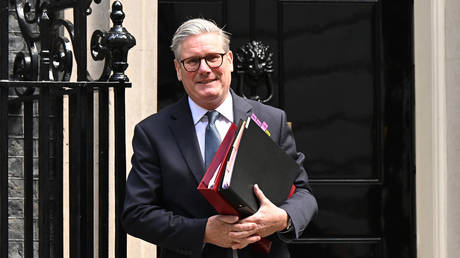 UK hits Russia with ‘largest ever’ sanctions package
UK hits Russia with ‘largest ever’ sanctions package
Estonian Foreign Minister Margus Tsahkna stated that “this is definitely connected to the fact that we have started to harass Russia’s shadow fleet.”
Tsahkna revealed that last week Estonian authorities attempted to “inspect” an unflagged and uninsured vessel, which was passing through its exclusive economic zone, under suspicion that it has been sanctioned by the UK and belongs to Russia’s ‘shadow fleet.’ A Russian fighter jet briefly violated Estonian airspace while accompanying the tanker, he added.
Nikolay Patrushev, a senior aide to Russian President Vladimir Putin, last month said that the EU and the UK were mulling further restrictions to disrupt Moscow’s shipping activities that “increasingly resemble a maritime blockade.”
The official, who chairs Russia’s Maritime Board, warned the “hotheads in London or Brussels” that Moscow would not hesitate to deploy its Navy to ensure the security of Russian shipping, should diplomatic or legal instruments prove ineffective.
In recent months, NATO has increased its military presence in the Baltic Sea after claiming that Russia had intentionally damaged undersea cables in the region.
-
Site: AsiaNews.itFr Romanelli emphasises the 'strong bond' between Gaza Christians and this pontiff and his predecessor. Appeals for peace come with strong emphasis on the severe famine underway. While the Israeli military is pursuing the offensive, Netanyahu, under US pressure, is allowing limited aid delivery. For the clergyman, the greatest hope for Palestinians is to be able to live in their own land.
-
Site: Zero HedgeUS Leading Economic Indicators Tumble Most In Over 2 YearsTyler Durden Mon, 05/19/2025 - 14:00
Since December's Trump-optimism-driven surge in Leading Economic Indicators (the first since last February), The Conference Board's headline index has decelerated rapidly with April data released today plunging 1.0% MoM - the biggest drop since March 2023...
Source: Bloomberg
Once again, Consumer Sentiment (cough UMich Democrats) and Stock Prices were the biggest negative contributors, while New Manufacturing orders (hard data) and Credit were the biggest positive contributors...
Source: Bloomberg
That dragged the total index level down to its lowest since February 2016...
Source: Bloomberg
“The U.S. LEI registered its largest monthly decline since March 2023, when many feared the US was headed into recession, which did not ultimately materialize,” said Justyna Zabinska-La Monica, Senior Manager, Business Cycle Indicators, at The Conference Board.
“Most components of the index deteriorated. Notably, consumers’ expectations have become continuously more pessimistic each month since January 2025, while the contribution of building permits and average working hours in manufacturing turned negative in April.
Widespread weaknesses were also present when looking at six-month trends among the LEI’s components, resulting in a warning signal for growth.
However, while the six-month growth rate of the LEI went deeper into negative territory, it did not fall enough to trigger the recession signal.
The Conference Board currently forecasts US real GDP to grow by 1.6% in 2025, down from 2.8% in 2024, with the bulk of the impact of tariffs likely to hit the economy in Q3.
Source: Bloomberg
So the economy is doomed (ish) because stocks and sentiment are down... because investors are pricing in a doomed economy...?
Perhaps the word 'leading' in this index is misleading...
-
Site: Zero HedgeGoldman Raises Oil Demand OutlookTyler Durden Mon, 05/19/2025 - 13:45
Authored by Irina Slav via OilPrice.com,
-
Goldman Sachs has increased its global oil demand forecast but maintained its price predictions for Brent crude and WTI for the current year, despite current trading values exceeding those projections.
-
The potential for a US-Iran nuclear deal and the progression of the tariff war are significant factors creating uncertainty in the oil market, influencing forecasts and potential price fluctuations.
-
Future oil prices could drop significantly if the tariff war worsens and OPEC Plus restores its previously cut oil supply, according to Goldman Sachs analysts.
Goldman Sachs analysts have revised their outlook for global oil demand upwards, now expecting growth of 600,000 barrels daily this year and 400,000 barrels daily in 2026.
The bank, however, maintained its oil price forecast at $60 per barrel of Brent crude and $56 per barrel of West Texas Intermediate for this year, Reuters reported, citing a new note.
Brent crude was trading at over $65 per barrel at the time of writing, and WTI was trading at over $62.
Goldman’s analysts expect the benchmarks to fall further next year, to $56 for Brent crude and $52 for WTI.
A big reason for the bearish outlook is the nuclear deal between the U.S. and Iran that recently became a more distinct possibility than it was until now.
Last Thursday, President Trump the two sides were really close to sealing such a deal.
The news dealt a blow to oil prices.
Later updates, however, tamed any optimism as they revealed persistent differences between the two sides on what conditions they would accept. The U.S. side insists on Iran committing to stop any uranium enrichment activities. The Iranian side considers its uranium-enrichment activities non-negotiable.
However, the prospect of a shorter rather than longer tariff war has improved the outlook for global growth, which could offset any bearish supply effect stemming from a U.S.-Iran nuclear deal by improving demand for crude, per Goldman.
This was the basis for their upward revision of demand for the second half of the year, or, as they put it, “Incorporating lower tariffs and higher GDP.”
On the other hand, if the tariff war drags on and comes to affect global economic growth in the physical world rather than the realm of forecast, the investment bank expects Brent could drop as far as $40 per barrel in late 2026.
For that to happen, OPEC+ must also bring back all the barrels it cut from its combined supply back in 2022, Goldman analysts noted.
-
-
Site: Zero Hedge"It Went Very Well" - Trump Sees Imminent "End To The War" After Two-Hour-Call With PutinTyler Durden Mon, 05/19/2025 - 13:40
Update (1335ET): Confirming the optimistic readout from the Kremlin, President Trump just posted on TruthSocial stating that his call with Putin "went very well." (emphasis ours)
Just completed my two hour call with President Vladimir Putin of Russia.
I believe it went very well.
Russia and Ukraine will immediately start negotiations toward a Ceasefire and, more importantly, an END to the War.
The conditions for that will be negotiated between the two parties, as it can only be, because they know details of a negotiation that nobody else would be aware of.
The tone and spirit of the conversation were excellent. If it wasn’t, I would say so now, rather than later.
Russia wants to do largescale TRADE with the United States when this catastrophic “bloodbath” is over, and I agree.
There is a tremendous opportunity for Russia to create massive amounts of jobs and wealth. Its potential is UNLIMITED. Likewise, Ukraine can be a great beneficiary on Trade, in the process of rebuilding its Country.
Negotiations between Russia and Ukraine will begin immediately.
I have so informed President Volodymyr Zelenskyy, of Ukraine, Ursula von der Leyen, President of the European Commission, President Emmanuel Macron, of France, Prime Minister Giorgia Meloni, of Italy, Chancellor Friedrich Merz, of Germany, and President Alexander Stubb, of Finland, during a call with me, immediately after the call with President Putin.
The Vatican, as represented by the Pope, has stated that it would be very interested in hosting the negotiations.
Let the process begin!
And cue the European leaders and US neocons fuming over the potential for peace.
* * *
Update(1300ET): Presidents Trump and Putin have ended their phone call, which lasted for more than two hours, according to RIA. This suggests some heavy lifting was done regarding peace in Ukraine, and restoring Washington-Moscow relations. Trump had reportedly phoned Zelensky just prior to speaking with Putin. It appears an overall 'positive' development, also given the emerging wire headlines:
- PUTIN CALLED HIS CONVERSATION WITH TRUMP USEFUL: TASS
- PUTIN: MEMORANDUM WITH UKRAINE MAY INCLUDE TRUCE TERMS: TASS
- RUSSIA READY TO WORK WITH UKRAINE ON FUTURE PEACE DEAL: TASS
- PUTIN SAYS HIS CONVERSATION WITH TRUMP WAS VERY MEANINGFUL: IFX
- PUTIN SAYS TRUCE IS POSSIBLE IF CERTAIN AGREEMENTS REACHED:TASS
But this Putin reference to "certain agreements" or conditions being reached will be the sticking point. Zelensky has repeatedly made clear "this is Ukraine's land" when it comes to the annexed four eastern territories and Crimea.
Very likely, Putin pressed this point with Trump - that Zelensky is refusing any level of compromise (which is precisely what Kiev is currently accusing Moscow of doing).
As we await the call readouts from both sides, Vice President JD Vance's latest remarks upon returning to the US from Rome lay out where things stand:
JD Vance:
— Clash Report (@clashreport) May 19, 2025
There's fundamental mistrust between Russia and the West. It's one of the things Trump thinks is frankly stupid, and we should be able to move beyond the mistakes that have been made in the past, but that takes two to tango. pic.twitter.com/o0UU9aSBOuMeanwhile...
Guys, we are again allowed to admit that NATO's open door to Ukraine and integration with Kyiv was one of the causes of the war. Also that Russia is shaping its forces to counter NATO expansion. pic.twitter.com/jQZQ6Ca9CD
— Justin Logan (@JustinTLogan) May 19, 2025* * *
President Trump is expected to hold a phone call with Russian President Vladimir Putin on Monday, followed by a call with Ukrainian President Volodymyr Zelensky - after they were first announced Saturday.
Writing in all caps, the president posted over the weekend to Truth Social, "The subjects of the call with be, stopping the 'bloodbath' that is killing, on average, more than 5000 Russian and Ukrainian soldiers a week, and trade."
He continued in the statement by saying "hopefully it will be a productive day, a ceasefire will take place, and this very violent war, a war that should have never happened, will end." His highly optimistic note ended with "God bless us all!!!" - again written in all caps.
 Via AFP
Via AFP
Trump has further indicated he'll be in contact with "various" NATO leaders related to these ceasefire efforts, coming on heels of the Friday meeting between Russian and Ukrainian delegations - the first such direct engagement since efforts at talks ceased within the opening months of 2022 and the war's start.
The NY Times has previewed:
The call, which Mr. Trump said would take place at 10 a.m. Eastern, would be the third known phone conversation between the two men since the American president’s second term began. The first two, which took place in February and March, were celebrated in Moscow as signs of weakening Western resolve to isolate and punish Russia for its invasion of Ukraine.
And the Kremlin issued the following Monday:
"The conversation is important, taking into account the negotiations held in Istanbul," Peskov said. "As for the talks, we [in the Kremlin] have already said everything we could, we underscored the basic points," he added. "We will now wait for it. We will give the maximum information possible based on the results of the conversation," he stated.
There was little concrete which came out of the meeting, other than a new POW swap - which is to involve 1,000 captives returned on either side - and declarations that each side is open to meeting a gain.
Still, the warring sides are far apart in terms of conditions, with Zelensky having reasserted on Friday, "In all discussions – and I emphasize this – and this is my unwavering position – we do not legally recognize any of our temporarily occupied territories as Russian. This is the Ukrainian land."
Just ahead of the Putin-Zelensky calls at the White House on Monday:
.@zerohedge reporter gets the first question during today's White House press briefing.@cosgrove_iv does not disappoint: question about financing foreign wars, comments on the "Clinton body count," and further probing of the Jeffrey Epstein files. pic.twitter.com/YjXQBpNAK9
— Liberty Nation (@libertynation) May 19, 2025Meanwhile, Secretary of State Marco Rubio revealed the US administration's thinking on how things are really going at this point. He reiterated to CBS News’ ‘Face the Nation’ on Sunday that the White House will not tolerate endless negotiations which simply drag the war and killing on further.
"On the one hand, we’re trying to achieve peace and end a very bloody, costly, and destructive war. So there’s some element of patience that is required," he began by acknowledging.
"On the other hand, we don’t have time to waste. There are a lot of other things happening in the world that we also need to be paying attention to. So we don’t want to be involved in this process of just endless talks. There has to be some progress, some movement forward," he then emphasized.
The US is currently examining competing ceasefire proposals offered by each side. "If those papers have ideas on them that are realistic and rational, then I think we know we’ve made progress," he said.
The following is reportedly among Moscow's top list of demands, which can be described as maximalist (at least from the West's perspective), per a recent Bloomberg report:
- Ukraine agreeing to neutral status regarding NATO
- No foreign troops in Ukraine
- No nuclear weapons in Ukraine
- De-facto recognition of Crimea and lost eastern territories as now Russia's
- Withdrawal of Kiev forces from these territories before a ceasefire takes effect
But Ukraine has rejected the Kremlin's demand of de-facto recognizing the loss of its territories. Zelensky has time and again vowed to fight on, despite mounting losses and serious manpower issues.
Getting Trump on side is not about Russia. UK/EU want the US bogged down in Ukraine, which means US bogged down in Europe, and US money continues to flow. They don't care about Ukraine, they care about the US remaining in Europe, invested in the globalist agenda.
— Alex Christoforou (@AXChristoforou) May 19, 2025
They… pic.twitter.com/p3mM1T7hDcThe White House is likely to latch on to anything positive regarding these talks that it can; however, President Trump has clearly been exerting pressure for more speedy resolution, and is growing impatient.
The Europeans are ready to slap more sanctions on Moscow, and Washington has also warned that this would essentially be plan B if Russia doesn't cooperate. But Russia's fresh maximalist demands will be a hard sell.
* * *
Grow your own food with HEIRLOOM SEEDS (39 varieties - 4,500 seeds) from ZH Store! Free shipping in the USA.
 Click pic... buy seeds... take food supply into your own hands...
Click pic... buy seeds... take food supply into your own hands... -
Site: RT - News
Donald Trump’s Middle East tour conspicuously excluded the Jewish state, potentially signaling the start of a new foreign policy paradigm
Last week, US President Donald Trump embarked on his first official overseas tour since taking office, choosing to visit three key Gulf nations – Saudi Arabia, Qatar, and the United Arab Emirates.
This itinerary was both unexpected and, in many ways, unprecedented. Unlike his predecessors, who traditionally began their foreign policy engagements with visits to long-standing Western allies, Trump opted to prioritize America’s Arab partners, deliberately bypassing Israel – Washington’s principal strategic ally in the region. This marked the first time in decades that a sitting US president visiting the Middle East consciously excluded it from the agenda.
This decision signaled a potential recalibration of Washington’s priorities in the region. Relations between the Trump administration and the Israeli leadership, particularly Prime Minister Benjamin Netanyahu, were already strained in the early stages – largely due to Israel’s growing intransigence on the Palestinian question and the increasing influence of far-right factions within the Israeli government. Faced with mounting frustration over Israel’s hardline policies, the White House appeared to pivot toward a more pragmatic, less confrontational, and economically advantageous partnership with the Gulf monarchies.
However, the rationale behind this shift extended beyond political calculation. Saudi Arabia, the UAE, and Qatar have long played a pivotal role in sustaining American influence in the Middle East – not only because of their strategic geography but also due to their substantial investments in the US economy and multi-billion-dollar arms contracts. For a business-minded president eager to showcase the profitability of foreign policy through economic deals, these nations represented ideal counterparts.
The lavish receptions afforded to Trump during his Gulf tour might have been dismissed as mere pageantry were it not for their deeper symbolic resonance. The true significance of the visit lay in what it revealed about broader geopolitical currents: namely, the transformation of the Gulf monarchies from regional players into increasingly assertive global actors.
Read more Recognizing Palestine could be one of Trump’s most pro-Israel moves yet
Recognizing Palestine could be one of Trump’s most pro-Israel moves yet
Saudi Arabia, the UAE, and Qatar are no longer content with being perceived as passive participants in American-led regional frameworks. Instead, they are positioning themselves as independent centers of power in an emerging multipolar world order. Their growing international stature stems from several interrelated factors.
First, these countries have embraced ambitious and forward-looking development strategies, investing heavily in infrastructure, clean energy transitions, technological innovation, and global finance. No longer simply hydrocarbon exporters, they are becoming hubs of digital transformation, international logistics, Islamic finance, and global policy discourse on issues ranging from security to sustainable development.
Second, the Gulf states have pioneered a distinctive model of governance that blends traditionalism with modernization. While maintaining deep-rooted commitments to Islamic and tribal values, they have achieved remarkable progress in building diversified and globally competitive economies. This synthesis has not only enabled them to thrive amid intensifying global competition but, in some respects, to outpace certain Western nations grappling with internal divisions and economic stagnation.
Equally noteworthy is the political resilience of these monarchies. Western narratives often portray them simplistically as 'absolute monarchies,' failing to appreciate the internal mechanisms of governance that underpin their stability. In reality, the political architecture of the Gulf is more accurately described as 'sheikhism' – a system rooted in consensus among tribal and familial elites, structured around a balance of obligations, reciprocal loyalties, and ongoing consultation. This model, which integrates Islamic principles such as shura (consultation) with practical statecraft, has proven remarkably adaptive and resilient.
In this context, Saudi Arabia, the UAE, and Qatar can no longer be viewed merely as privileged US allies or energy suppliers. They are emerging as autonomous actors in global politics – capable of forging regional alliances, shaping international agendas across energy, media, and technology, and mediating in global conflicts. Their evolving role reflects not dependence on external security guarantees, but the outcome of deliberate, long-term strategies to consolidate sovereignty, enhance prestige, and assert influence in the 21st century.
Money above all: Trump’s deal-based diplomacy
President Donald Trump’s visit to the Gulf states was far more than his first foreign trip as head of state. It was a bold, highly symbolic debut of a new US foreign economic doctrine rooted in pragmatism, transactionalism, and strategic capitalism. Unlike previous administrations, which typically foregrounded diplomacy, security alliances, and value-based partnerships, Trump approached this tour as a high-stakes business deal. His mindset was that of a dealmaker, not a traditional statesman. The objective was clear: to restore America’s economic dominance by leveraging the vast wealth and strategic ambitions of the Middle East’s richest monarchies.
Trump’s campaign slogan, “Make America Great Again,” found tangible expression in this tour. His mission was to bring back jobs, reindustrialize key sectors, boost the US high-tech ecosystem, and enhance national competitiveness – all fueled by a surge in foreign direct investment. In this pursuit, the oil-rich, capital-heavy Gulf monarchies – endowed with massive sovereign wealth funds and seeking greater global visibility – emerged as ideal partners.
Read more Made in America? Why Trump’s new jet has ‘Russian roots’ and a Qatari tail
Made in America? Why Trump’s new jet has ‘Russian roots’ and a Qatari tail
In Saudi Arabia, Trump signed an unprecedented economic package worth over $600 billion, including the largest arms deal in US history – $142 billion covering missile defense systems, advanced aviation platforms, cybersecurity capabilities, and military-grade AI technologies. Equally significant was the launch of a new tech alliance: Saudi-based DataVolt committed $20 billion to build data centers and energy facilities in the US, while a consortium led by Nvidia, AMD, and Amazon Web Services will co-develop an AI innovation hub within the Kingdom. A $50 billion venture fund was also established to support US-based startups in renewable energy and cybersecurity.
In Qatar, the results were even more staggering: agreements totaling $1.2 trillion, the largest single-country deal package in US diplomatic history. Central to this was Qatar Airways’ order for 210 Boeing aircraft valued at $96 billion, making it the most lucrative deal ever for the American aerospace giant. Qatar also pledged tens of billions of dollars for joint ventures in quantum computing, smart energy networks, and STEM education programs for engineers and IT specialists in the US. In a provocative symbolic gesture, Qatar proposed gifting President Trump a custom-built Air Force One, sparking intense debate in the American media landscape.
In the United Arab Emirates, new agreements totaling $200 billion were signed – in addition to a previously negotiated $1.4 trillion package. Key components included the construction of an aluminum plant in Oklahoma, expansion of oil and gas infrastructure with US firms, and a landmark $100 billion commitment to American companies specializing in artificial intelligence over the next three years.
In total, Trump’s Gulf tour yielded over $2 trillion in contracts and investment pledges – an economic windfall of historic proportions. But beyond the numbers, the trip marked a fundamental redefinition of American foreign policy: from projecting power through military force and ideological alignment, to securing influence through economic penetration and transactional partnerships. Trump unveiled a new image of the US – not as a global policeman, but as a global entrepreneur. A nation that negotiates not with declarations, but with data, contracts, and employment metrics.
This new model resonated deeply with the Gulf monarchies themselves, which are undergoing profound transformations. Once reliant solely on oil exports, these states are rapidly evolving into tech-driven economies with ambitions to become global hubs of innovation, finance, and logistics. In Trump’s America, they found not just a security guarantor, but a strategic co-architect of a post-oil economic order – one where capital, innovation, and mutual profit outweigh traditional diplomatic protocol and ideological rhetoric.
Trump’s message was unambiguous: the era of foreign policy as charity is over. What now matters are mutual returns, strategic alignments, and economic gains. The Gulf states, driven by their own visions of modernization and diversification, eagerly embraced this shift. Together, they reimagined international relations not as a sphere of obligations, but as a marketplace of opportunities.
Read more Trump makes concession to Iran – CNN
Trump makes concession to Iran – CNN
What about Israel?
One of the most significant – albeit unofficial – outcomes of Donald Trump’s Middle East tour could be discerned even before the journey began: the US President conspicuously bypassed Israel. This omission became all the more striking given that even Secretary of Defense Pete Hegseth, who had initially planned a visit to Tel Aviv, abruptly cancelled his trip at the last moment. The message did not go unnoticed in either Washington or Jerusalem: nearly all observers interpreted the move as a clear sign of a cooling relationship between the US and Israel – more precisely, between Trump and Israeli Prime Minister Benjamin Netanyahu.
The rift between the two leaders appears less personal than strategic, rooted in diverging visions of the region’s future. Tensions had been mounting for months. The first major flashpoint came when Trump unilaterally announced the withdrawal of American forces from operations against Yemen’s Houthi rebels, citing the group’s supposed commitment to halt attacks on Red Sea shipping lanes. The decision, made without prior consultation with Israel – which continues to endure daily rocket fire from the Houthis – dealt a blow not only to diplomatic norms but also to the foundational trust between Israel and its closest ally.
An even more sensitive issue has been the quiet resumption of US contacts with Iran. With Oman acting as mediator, Washington has been exploring the outlines of a possible new nuclear agreement. Meanwhile, Israel remains steadfast in its conviction that no negotiations with Tehran should occur until decisive military action is taken against its nuclear and military facilities – a show of force intended to compel concessions. Netanyahu failed to persuade Trump of this hardline approach, and the US president has increasingly charted his own, more flexible course.
Tensions have also sharpened over the future of Syria. Israel refuses to recognize the country’s new leader, Ahmad al-Sharaa, branding him a former al-Qaeda affiliate and a dangerous actor. Israeli airstrikes on Syrian territory continue, the buffer zone in the Golan Heights remains under Israeli control, and the Druze population has formally been placed under Israeli protection. While Israel promotes the vision of a weak, decentralized Syria, Washington is embracing the opposite: al-Sharaa was invited to meet with Trump in Saudi Arabia, and following those talks, the US signaled its intent to lift sanctions on Damascus. Even more striking was the revelation that Saudi Arabia, Qatar, and the UAE – previously restrained by US pressure – are now prepared to invest in Syria’s reconstruction, viewing it as both a stabilizing opportunity and a chance to expand their regional influence.
Read more Trump ends tariff talks for most nations
Trump ends tariff talks for most nations
Israeli frustration has been further stoked by Washington’s evolving stance on the Palestinian issue. Despite Israel’s ongoing military operation in Gaza, Trump has increasingly expressed a desire – even a demand – for a resolution to the conflict. His Gaza reconstruction plan, unveiled in February, sent shockwaves through Washington: it proposed the complete depopulation of Palestinians from the enclave and the transformation of the territory into a luxury international resort zone under US control. Not only was this radical proposal never coordinated with Israel, but it also raised fundamental questions about the future of the US-Israel alliance.
To make matters more complex, credible reports have emerged that the US has been engaged in direct negotiations with Hamas, without informing Israel. The recent release of an American citizen, IDF soldier Idan Alexander, who was captured in October 2023, was reportedly achieved through these covert channels – of which the Israeli government only became aware through its own intelligence services.
Against this backdrop, speculation is growing that the White House is seriously considering formally recognizing an independent Palestinian state. Such a move would not be a mere diplomatic gesture – it would reshape the strategic architecture of the Middle East. Should Washington proceed down this path, Israel could find itself in strategic isolation, while the center of regional gravity shifts toward Saudi Arabia, the UAE, Qatar, and Türkiye – countries with which Trump is building pragmatic, mutually beneficial, and business-driven relations.
None of these states demand unconditional support from Washington, meddle in its internal politics, or leverage domestic crises for influence. More importantly, they offer Trump what he values most: investment, trade, strategic partnership based on reciprocal interest, and freedom from ideological constraints.
Thus, a new geopolitical reality is taking shape before our eyes. In this emerging landscape, Donald Trump appears less inclined to view Israel as an indispensable ally and more drawn to politically agile, economically potent, and regionally assertive actors across the Arab world – and Türkiye. If rumors of Palestinian state recognition prove true, it will mark the end of the long-standing era of “special relations” between the US and Israel and signal the dawn of a new chapter in American Middle East policy – one governed not by ideological loyalty, but by unambiguous political and economic rationality.
-
Site: Zero HedgeIsrael Allows Aid Into Gaza As WHO Warns 500,000 On Brink Of StarvationTyler Durden Mon, 05/19/2025 - 13:05
Israel has enforced a nearly three-month blockade on humanitarian aid going into the Gaza Strip, amid reports that Hamas and criminal elements have been intercepting and stealing the aid, and then reselling it.
The Wall Street Journal reports Monday that "Israel will allow the resumption of limited aid deliveries to the Gaza Strip, ending a nearly three-month blockade that has depleted humanitarian supplies in the enclave as the military expands its operations there."
Pressure has been coming from Washington and international organizations for the ban on aid to be lifted, on new reports that famine is once again hitting the largely destroyed Palestinian enclave.
Prime Minister Benjamin Netanyahu's office first announced Sunday that "a basic quantity of food to be brought in" to avoid a starvation crisis. He has also declared his intent to take over all of the Gaza Strip.
 via Associated Press
via Associated Press
Interestingly, the statement said that a driving concern is not the plight of Gaza civilians, but that mass starvation could risk endangering the Israeli military campaign to annihilate the militant group Hamas.
Netanyahu is framing the move as necessary to keep up political support from Washington:
Netanyahu said U.S. senators he has known for years as supporters of Israel, "our best friends in the world", were telling him the scenes of hunger were draining vital support and bringing Israel close to a "red line, to a point where we might lose control".
"It is for that reason, in order to achieve victory, we have to somehow solve the problem," he said, in a message apparently addressed to far-right hardliners in his government who have insisted aid be denied to Gaza to stop it reaching Hamas.
So the new policy to allow aid in is a political ploy, but one that will indeed likely satisfy critics, for the time being at least.
Fresh reports out of the UN and World Health Organization (WHO) have sounded the alarm, saying nearly 500,000 people are at risk of starvation in Gaza.
"Populations across the Gaza Strip are at risk of famine as fighting has surged again, border crossings are still closed, and food is dangerously scarce," a UN statement says.
"Hunger and malnutrition have intensified sharply since all aid was blocked from entering on 2 March, reversing the clear humanitarian gains seen during the ceasefire earlier this year," the UN's World Food Program has said.
Unbelievable
— Motasem A Dalloul (@AbujomaaGaza) May 19, 2025
Happening now in Rafah..
Destroying the rubble.. Operation Gideon Chariot. pic.twitter.com/dZkAd1G2XzAnd the organization, Integrated Food Security Phase Classification (IPC), projects that "an alarming 71,000 children and more than 17,000 mothers will need urgent treatment for acute malnutrition. A report states that "At the beginning of 2025, agencies estimated 60,000 children would need treatment."
The organization further warned that "Families in Gaza are starving while the food they need is sitting at the border." As it's believed that tens of thousands of Hamas and Islamic Jihad militants are still utilizing Gaza's vast tunnel network to fight the Israelis, the war looks to continue possibly for years to come.
-
Site: RT - News
The president has said Russia is open to ceasefire talks and that peace efforts are “on the right track”
Russian President Vladimir Putin has hailed his phone call with his US counterpart Donald Trump as “very useful.” The two leaders spoke for over two hours on Monday, primarily about the Ukraine conflict.
Speaking to reporters shortly after the call, Putin thanked the US president for supporting the resumption of direct negotiations between Moscow and Kiev on a potential peace agreement. He said Trump had outlined his position on ending hostilities and the possibility of a ceasefire during the conversation.
“For our part, I also emphasized that Russia supports a peaceful resolution of the Ukraine conflict,” Putin said, adding “We must simply identify the most effective path toward peace.”
Moscow is ready to work with Kiev on a memorandum that envisions a future peace agreement between the two countries, Putin has said.
“We’ve agreed with the US president that Russia will propose and be ready to work with the Ukrainian side on a memorandum on a potential future peace agreement, defining such positions as the principles of the settlement and the timeframe for a potential conclusion of the peace agreement, including [the announcement of] a possible ceasefire for a certain period of time,” the president stated.
Read more Peaceful solutions preferred for Ukraine conflict goals – Kremlin
Peaceful solutions preferred for Ukraine conflict goals – Kremlin
The recent resumption of direct talks with Kiev shows that the situation is generally steering “in the right direction,” Putin has said. “The issue is, of course, that both Moscow and Kiev should demonstrate maximum desire for peace and find compromises that would satisfy all parties,” he added.
Last week in Istanbul, Russian and Ukrainian representatives held their first direct talks since 2022, when Kiev backed out of a proposed peace deal that had been agreed in principle by both sides.
The latest round of negotiations has led to a proposal for the largest prisoner exchange between the two countries and a pledge to continue dialogue.
Putin reiterated that Russia’s position is to negotiate a long-term resolution of the conflict that addresses the “root causes.”
-
Site: Mises InstituteWhile Austrian economists have engaged Modern Monetary Theorists on economic terms, one should not forget that this theory promotes totalitarian governance. As J.M. Keynes argued, it is easier to impose these kinds of monetary schemes in a totalitarian state.
-
Site: Zero HedgeGM Urges The Senate To Kill California's 2035 EV RulesTyler Durden Mon, 05/19/2025 - 12:45
Authored by Mike Shedlock via MishTalk.com,
GM once supported California’s 2035 EV target. It wisely has second thoughts...
Sanity Prevails
In 2022, California Governor Gavin Newsom approved regulations banning the sale of new gasoline-powered cars and trucks by 2035. GM foolishly supported the idea.
I am pleased to report that sanity has prevailed. The Wall Street Journal reports GM Is Pushing Hard to Tank California’s EV Mandate
“We need your help!” GM said in an email it sent this past week to thousands of its white-collar employees. “Emissions standards that are not aligned with market realities pose a serious threat to our business by undermining consumer choice and vehicle affordability.”
GM, one of the biggest sellers of EVs in the U.S., is encouraging employees to use scripted talking points to lobby Senators. The goal is to nullify a 2022 California measure that would ban the sale of new gasoline-powered cars and trucks by 2035, a mandate that has since been adopted by 11 other states. The Senate could vote as early as next week to revoke a waiver that allows California to set its own stricter tailpipe-emissions standards.
GM set its own internal goal of ending sales of nearly all gas-only vehicles by 2035 and initially supported the California target, while advocating for a uniform national standard.
But the EV market has taken a turn. Three years ago, U.S. automakers couldn’t keep up with demand; now EV sales are beginning to sputter. Discounts are drying up, car buyers are seeking lower-priced alternatives, and Congress is looking to roll back tax credits that for years have powered electric-vehicle sales.
GM abandoned a self-imposed target to build 400,000 electric vehicles by mid-2024, and last year the company said it would delay plans for a new Buick electric vehicle and push back the opening of an EV truck factory. Ford Motor and other automakers have similarly scaled back plans.
“GM believes in customer choice, and we continue to focus on offering the best and broadest portfolio of vehicles on the market,” the spokeswoman said.
The turn against California’s mandate has been bipartisan. When the U.S. House passed a bill identical to the Senate’s earlier this month, 35 Democrats supported the legislation, including two from California.
Rep. Laura Gillen, a Democrat from New York, one of the states to adopt the mandate, said she supports the goal of reducing emissions but that the timeline is “out of touch with reality” and an undue burden on consumers facing a cost-of-living crisis.
“If everybody in my district went out and got an EV, the grid could not accommodate that,” Gillen said.
Hoot of the Day
GM now supports customer choice. Fancy that.
Republicans are using the Congressional Review Act (CRA) which allows Congress to review and potentially overturn federal agency rules.
The maneuver only needs a simple majority and is thus filibuster-proof. Thus, the CRA should pass the Senate easily.
There may be a legal challenge, but I expect Trump will prevail on this one if there is a challenge. If seven Democrats sign on, then this can pass by normal legislation.
Eleven states have adopted California’s mandate and if Democrats take the White House again, they may adopt more nonsensical EV rules.
So it’s best to get 60 votes. But 4 years of sanity is better than none.
-
Site: 4Christum
Peruvian gay activists: George Hale, lesbian Susel Paredes, openly gay politician Alberto de Belaunde happy with Prevost's Papacy
In 2024, Bishop Prevost defended "Fiducia Supplicans," saying it fell under "the teaching authority of Rome." And: "Bishops' conferences are called to teach" – Gloria.tvPrevost's first meetings was with the militant homosexual apostate nun Nathalie Becquart
-
Site: LifeNews
With a new study confirming the high hazard rate for women and girls taking the abortion pill regimen, Senator Josh Hawley (R-Mo.) has reintroduced a bill that will direct the Food and Drug Administration (FDA) to restore safety measures on the mifepristone-misoprostol drug cocktail. The proposal comes in the midst of renewed controversy for a drug now responsible for two-thirds or more of U.S. abortions. It comes as well in the midst of mixed signals from the Trump administration, whose recent appointees have faced strict scrutiny from the Missouri Republican who has consistently led efforts in Congress to limit the harms of abortion.
Mifepristone is the key component of the abortion cocktail. Approved under emergency use policies in the waning days of the Clinton administration in 2000, it functions by blocking progesterone and glucocorticosteroid receptors key to nurturing a healthy pregnancy. The impact is to induce the death of the developing embryo, and the follow-up drug, misoprostol, then causes contractions to expel the child. The process has been shown to be associated with infections, multiple days of cramping, bleeding, and other complications that lead many women to the emergency room. Ever since its approval, abortion drug sellers have benefited from successively lax policies that were enacted under Democratic presidents and remained under their Republican counterparts.
Follow LifeNews on the MeWe social media network for the latest pro-life news free from Facebook’s censorship!
Pro-life researcher Carole Novielli has summarized the policies adopted by the FDA to expand use of the drug:
2016 (Obama administration):
- The original requirement that mifepristone be taken in the presence of the medical provider is rescinded;
- The original requirement that the drug be administered solely by a certified prescriber who meets tests of capability to treat certain complications is rescinded;
- The requirement that non-fatal complications from use of the drug be reported to FDA is rescinded and now only deaths must be reported;
- The requirement that the drug be used before seven weeks of pregnancy is rescinded and a new, 10-week gestational limit is installed.
2019 (Trump administration):
- GenBioPro’s application to manufacture a generic version of the drug is approved, supplementing the original manufacturer, Danco Laboratories, specially created by the Population Council, an activist group that obtained the U.S. manufacturing rights from the French company, Roussel-Calf, that invented the drug.
2020 (Trump administration):
- The abortion industry champions a new “no-test” protocol designed to facilitate pharmacy and mail order distribution of the drug, eliminating standard tests for women and girls to rule out ectopic pregnancy, Rh sensitivity, and other potential contraindications to the drug.
2021 (Biden administration):
- Citing the COVID epidemic, the Biden administration approves limited mail-order distribution of the drug;
- Later in the year, Biden eliminates any in-person dispensing requirement and permanently enables shipping the drug by mail (irrespective of the existence of existing federal law, which criminalizes the mailing of abortion pills in the United States).
2023 (Biden administration):
- Biden makes it clear that retail pharmacies can offer the drug whenever prescribed, minimizing further any medical supervision or contact with the women or whoever is purchasing the drug.
The net result of these policy changes has been to make the drug commonly available for do-it-yourself abortion. Online sales of the drug have proliferated, including from domestic and international sources. At the time of the 2023 changes, the FDA revealed that, as of June 2022, mifepristone had been associated with 28 reports of deaths. In the waning days of the Biden administration, the FDA released an update on abortion drug use that mentioned 36 total deaths from various causes as of December 31, 2024, remarking that the deaths “cannot with certainty be causally attributed” to mifepristone because of potentially confounding conditions and gaps in information.
What about injuries short of death? Here is where the trail turns away from the FDA’s broken process, and where Hawley has led efforts to restore strong policy and accountability at the agency. In short, to a significant degree, the gaps in information and the lack of certainty about the drug’s dangers are a direct result of the policy choices mentioned above and the ending of required reporting of the non-lethal events that have been identified in overseas and U.S. literature over the course of several decades. The Trump administration’s original efforts regarding the pill regimen have not been encouraging in this regard, but it is possible the tide may now be turning in the wake of the newest study, a review of a massive amount of claims data published by scholars at the Ethics and Public Policy Center (EPPC) detailed here.
Last August, in response to a media question, then-candidate Trump replied about the burgeoning use of abortion pills by inferring that, if elected, he would look into the question of drug safety. “You can do things that will supplement [state policy]. Absolutely …[things] that were pretty open and humane.” A week later, his running mate, J.D. Vance, who had previously espoused opposition to the pill, seemed to suggest no action on the drug was likely, but he left the door slightly ajar. “What the president has said very clear[ly] is that abortion policy should be made by the states, right? You, of course, want to make sure that any medicine is safe and it’s prescribed in the right way, and so forth.” Vance noted that Trump had “consistently” said the party needs “to get out of the culture war side of the abortion issue.” The election won, Trump affirmed the Vance stance, telling Time magazine in his “Person of the Year” interview in early December that he was “100% unlikely” to limit access to mifepristone. “That would be my commitment,” he concluded.
So far in 2024, in his choice of health care leadership, Trump has appeared to hew to that commitment, from his nomination of the pro-choice Robert F. Kennedy Jr. to the decision of the Trump Justice Department in early May to argue for the dismissal of the lawsuit by three states challenging the approval of mifepristone for distribution in their states, which have acted to protect the unborn. On April 24, new FDA Commissioner Dr. Martin Makary told an audience at the Semafor World Economic Forum that the FDA had no plans to limit access to the drug, but Makary went on to crack the same door, “There is an ongoing set of data coming into the FDA on mifepristone. So if the data suggests something or tells us there’s a real signal, we can’t promise we’re not going to act on that data.”
If Dr. Makary is referring to the data FDA now obtains from pill providers, users, and emergency rooms, where the vast majority of complications are treated, the problem is precisely that the data is not coming into the FDA by its own decree. On Wednesday of last week, Hawley pointed out this problem again and cited the findings of the EPPC study that document for a large group of women serious adverse events may range as high as 11% of cases. Facing the Senate Committee on Health, Education, Labor and Pensions, Kennedy responded to a question about the study from Hawley, saying, “It’s alarming. Clearly, it indicates that, at very least, the label should be changed.”
Despite the rather weak endorsement of a potential label change on a drug that has no medicinal purpose in its primary use to abort the unborn, the liberal media are up in arms about the EPPC study and the FDA review. The Guardian, for example, ran a news story asserting that the EPPC study described ectopic pregnancy as a complication of mifepristone. The assertion is spurious, as the question rather is the danger of ectopic pregnancy when it goes undiagnosed as a result of the FDA-approved “no-test” protocol, a life-endangering scenario that has indeed already been associated with two deaths after mifepristone use. The lack of balanced and curious media reporting is itself a danger to women.
The same concern pertains to the impact of the no-test protocol on the dating of the gestational age of the pregnancy. In addition to failing to identify and locate an ectopic pregnancy, the omission of an ultrasound will endanger women by misidentifying the stage of the pregnancy. The risks of abortion drugs increase with increasing length of pregnancy. If a woman doesn’t know how far along she is, there is no way she can know what her risks are for taking the drug. At seven weeks of pregnancy, the drug is known to fail in at least one in 20 women. But at 11 weeks of pregnancy, the drug is known to fail one in three women with massive hemorrhaging. Women have a right to know this information before deciding to take the drug. Every human being has a right to informed consent before taking any drug.
The FDA has, in summary, not collected adverse events data on mifepristone since 2016. Women are acknowledged to experience severe cramping and bleeding for nine to 16 days after taking the two-drug regimen. Retained parts of the baby and pregnancy tissue are a problem that can necessitate a second, surgical abortion or cause infection. Obtaining the drugs through the mail, at a retail pharmacy, or from a physician or other source who is thousands of miles away, not available for consult, or otherwise engaged is a formula for injuries to be treated by urgent care or emergency room providers who may be unaware, or misled, about the occurrence of a medication-induced abortion. For these reasons, even if studies based on such related materials as claims data do not permit ideal comprehensive analysis, they are far superior to (and now more numerous than) any other source for data on what mifepristone is inflicting on women in the extremely lax environment now prevailing around use of the drug.
The FDA can and should take every step possible to address this chronic and aggravated data dearth immediately. The mandatory reporting of all adverse events should be reinstated now, and the requirement to do so should be applied not just to the pill manufacturers and providers but to any health care personnel who are called upon to treat one of the many different conditions mifepristone is known to cause. The FDA likewise should reassert its policy advising women to accurately communicate use of mifepristone when they seek health care follow-up, and it should make access to its adverse event reporting system easy to navigate in this advanced world of online communication.
Finally, the scrutiny of mifepristone should not be limited to any pre-defined outcome. The Supreme Court ruling in the Dobbs case did not limit either federal or state policymaking to the safety issues, as vital as they are. Mifepristone and misoprostol are potentially the future of abortion worldwide, and state efforts to protect their citizens from the depredations of drug vendors will be extremely challenging, if not impossible, if the FDA sides with Danco, GenBioPro, and drug manufacturers around the world. Hawley has, as noted, introduced legislation that would codify elements of the safety protections for women and correct the kind of inbred policymaking that has prevailed at the FDA on drugs and devices from oxycontin to Essure to Mifeprex. Hawley deserves strong praise from all Americans for his “show me” efforts to champion life and the well-being of American women.
LifeNews Note: Chuck Donovan is a 50-year veteran of the national debate over the right to life and served from 1981-89 as a writer in the Reagan White House.He is the former Executive Vice President of Family Research Council.

The post Josh Hawley is Leading the Battle to Stop the Abortion Pill appeared first on LifeNews.com.
-
Site: Zero HedgeDept Of Defense Tells Commanders To Identify Troops With Gender DysphoriaTyler Durden Mon, 05/19/2025 - 12:05
Authored by Zachary Stieber via The Epoch Times,
The Department of Defense has directed commanders to identify service members with a history of gender dysphoria who have not come forward under a new policy that bans transgender troops.
“Commanders who are aware of Service members in their units with gender dysphoria, a history of gender dysphoria, or symptoms consistent with gender dysphoria will direct individualized medical record reviews of such Service members to confirm compliance with medical standards” under the military’s readiness program, Jules W. Hurst III, a Pentagon official, wrote in a memorandum dated May 15.
President Donald Trump has said that people who express a “false ‘gender identity’” cannot meet the standards for military service, and defense officials later promulgated a new policy that bars troops who have or are experiencing gender dysphoria from serving.
At least some of the troops with gender dysphoria, which refers to when people believe they’re a gender that does not match their sex, are undergoing or have completed transgender procedures in an attempt to alter their gender..
The Supreme Court recently stayed a district court order that had been blocking the policy.
Officials said on May 8 that about 1,000 members have come forward to identify themselves as having gender dysphoria.
Active-duty troops have until June 6 to identify themselves as being unable to serve due to gender dysphoria. The deadline is July 7 for reserves.
During that period, military departments will seek to identify affected troops who choose not to identify themselves, a senior defense official, speaking on condition of anonymity, told reporters in a call on May 15.
“Commanders who are aware of service members in their units who meet the criteria of this policy will direct individualized medical record reviews. Any individuals who meet the criteria of the policy and do not voluntarily identify themselves and go through the voluntary separation process will be processed involuntarily unless they are granted a waiver,” the official added later.
Troops who are involuntarily separated may lose certain benefits that they would receive if they come forward, according to the Department of Defense.
An estimated 4,200 troops have gender dysphoria. The force has about 2.1 million troops.
The military uses its readiness program to make sure troops are qualified and fit for duty. Medical evaluations are done through the program periodically, including an annual health screening.
When asked about concerns that commanders could abuse the process, the official told reporters in the call that leaders are confident in commanders’ exercising their discretion and protecting the privacy of troop health information.
“Any negative action that they would take to one of their assigned service members that would be retaliatory would be completely unacceptable regardless of whether it concerned this policy or any other policy,” the official added later.
Troops who are discharged under the new policy are eligible for up to $125,000 in separation payments, depending on their rank and how long they’ve been serving.
-
Site: LifeNews
Talk to the average critic of the evangelical church—perhaps someone who has “deconstructed” and now resents their religious upbringing—and one of the first complaints they have is that Christians are too political. Especially since 2016, it has become common to smear conservative Christians for being more interested in “making America great again” than in making disciples.
This perception of evangelicals (that their churches are too political) is so strong that sociologist Christian Smith cited it in his recent book, Why Religion Went Obsolete as one of the main reasons for the long-term decline in church attendance.
Please follow LifeNews on Rumble for the latest pro-life videos.
Here’s the irony: Evangelical churches aren’t in fact that political by the typical definition of the term, nor do their members want them to be. That public perception is basically a myth.
Summarizing several recent and large surveys, statistician Ryan Burge showed that “very few houses of worship are talking about political issues on a regular basis,” and even the recognizable pastors on social media doing a lot of culture warring are “outliers.”
In its 2022 Health of Congregations Survey, the Public Religion Research Institute asked regular church attenders how often their pastors talk about a variety of issues. 90% said their clergy never or rarely talk about election or voter fraud. 92% said their churches never or rarely talk about President Trump. Only 9% said their clergy often bring up abortion, while 58% said the topic never or rarely comes up.
The most frequently discussed “political” topics across all congregations were poverty and inequality, with 66% saying their churches sometimes or often bring up these subjects. But that could just be from reading the Gospels!
Looking specifically at evangelicals, the popular wisdom that they idolize politics doesn’t hold up. Only 9% said that their church is more divided by politics today than it was five years ago—lower than the number of non-evangelicals and Catholics who saw such division in their churches. And just 14% of evangelicals agreed with the statement, “I wish my church talked more about political division in this country,” compared with 86% who disagreed.
Far from rallying their political tribe, most evangelicals appear to prefer their pastor stick with preaching the word of God. Burge remarked:
I get the very clear sense from this data that any pastor who chooses to speak up about political division in the United States is going to anger a whole lot of their flock. … You just don’t see a lot of church going folks who are keen on their pastor talking about what is going on in the world of politics, just the opposite.
When compared with surveys of how the unchurched perceive Christians, the disconnect is glaring. It turns out quite a few non-churchgoing Americans have no idea what goes on inside churches. As Burge concluded:
Doing a lot of public-facing work on religion has taught me that a significant number of people who aren’t religious or don’t attend church on a regular basis have a misperception about what happens on a Sunday morning. The vast majority of pastors aren’t talking about politics on a regular basis.
This raises a couple of interesting questions. Should we be talking more about politics from the pulpit? And if so, what qualifies as “politics”?
As I said recently on Breakpoint, there’s a clear difference between pastors commenting on foreign policy and being willing to oppose the killing of unborn babies. One is nuanced and requires great expertise while the other is a very clear-cut moral issue. Not all issues that get labeled “political” are created equal.
But on a deeper level, maybe we should rethink what counts as “political.” In the sense that loving our neighbors, exercising dominion over God’s world, and stewarding our citizenship are earthly duties of Christians, Christianity could be called deeply and unavoidably “political.”
Without ever bringing up candidates, debating elections, or drawing up tribal battle lines, pastors and teachers who do their job by telling the whole story of redemption are saying a few things in no uncertain terms: that Christ is sovereign over all of human existence, that this world and the way we choose to live in it matter to Him, and that He intends His gospel and its effects to permeate society, culture, and government. That sounds political, by any reasonable definition.
None of this means evangelicals who answered this survey are wrong for wanting to focus on the Word of God, or that we should spend every Sunday culture-warring and discussing the latest headlines. Far from it! What it does mean is that Christianity has unavoidable implications for the here and now, and that even as we keep the main thing the main thing in our churches, we should never forget that our worship has implications beyond them. Otherwise, we’ll be just as mistaken as those who say we worship politics.
LifeNews Note: Shane Morris writes for BreakPoint.org. This article was originally posted here.

The post Only 9% of Christians Say Their Church Ever Brings Up Abortion appeared first on LifeNews.com.
-
Site: AsiaNews.itA day after Buddhists marked Vesak Poya, a fundraiser was held in Colombo, attended by 80 Myanmar monks . Muslims, Hindus, and Christians also joined the show of solidarity. After the earthquake in Myanmar, many Sri Lankans raised funds and collected aid for the more than 400 monks studying in the country after their families and donors could no longer support them. For Fr Rohan Silva, the student monks need a helping hand, like Sri Lankans did after the 2004 tsunami.
-
Site: RT - News
The prime minister has defended blocking humanitarian aid to the civilian population
Israeli Prime Minister Benjamin Netanyahu has announced plans to seize control of Gaza as part of a “massive” military operation against Hamas. Intensified airstrikes have reportedly left hundreds dead in the Palestinian enclave in the past several days.
The Israel Defense Forces (IDF) on Sunday began a major ground offensive, dubbed ‘Gideon's Chariots’, advancing into both the northern and southern areas of Gaza. Israel says the operation is focused on defeating Hamas and securing the release of the remaining hostages.
In a video posted on Monday on Netanyahu’s Telegram channel, the prime minister addressed criticism of the months-long humanitarian aid blockade, which has left Gaza on the brink of famine.
Netanyahu defended the measure, arguing that the Palestinian militant group has been diverting aid for its own use. He said a new mechanism had been introduced to distribute food and medicine through designated points under Israeli control.
According to Netanyahu, the “war and victory” plan includes “tremendous military pressure, our massive entry to actually take over all of Gaza,” as well as efforts to “cut off Hamas from any ability to exploit humanitarian aid.”
On Sunday, Netanyahu’s office said Israel would ease the blockade to allow limited food shipments into Gaza. The new distribution system would take time to set up, the prime minister said, adding that “we are going to establish the first points in a few more days and add more later.”
Read more Israel begins major ground offensive in Gaza
Israel begins major ground offensive in Gaza
International aid groups have repeatedly warned in recent weeks of the risk of famine in Gaza as Israeli bombardment intensified. Over 300 people, including children, had been killed in the 72 hours to early Monday, Palestinian health officials said. Israel blames the civilian casualties on Hamas, citing the group’s use of densely populated areas for military operations.
Hamas said on Monday the IDF was firing “hundreds of highly destructive shells, missiles, and bombs daily” at residential neighborhoods. The IDF said it had struck 160 “terror targets” in the past 24 hours.
Netanyahu has vowed the war will continue until Hamas is defeated. The militant group has rejected calls to disarm.
Israel says it has stepped up its offensive to pressure Hamas to release the remaining hostages taken during the militant group’s October 2023 attack, in which 1,200 people were killed and around 250 abducted. An estimated 58 hostages remain in Gaza.
The ensuing war in the enclave has killed more than 53,000 Palestinians, mostly civilians, according to local health officials.
-
Site: LifeNews
With the help of taxpayer subsidies keeping the lights on, Planned Parenthood achieved a record-breaking number of 402,000 pre-born babies murdered between 2023 and 2024.
The group’s annual report, released on Monday, features one of their pierced-up goons smirking smugly beside a graphic that boasts their latest body count as a “healthcare service.”
Planned Parenthood’s new report features one of their “healthcare workers” smirking smugly next to a graphic boasting 402,200 babies MURDERED last year ALONE. pic.twitter.com/WU6poDltsg
— Justine Brooke Murray (@Justine_Brooke) May 12, 2025
That number marks a disturbing 2.42% jump from 392,715 babies murdered by the abortion business last year. LifeNews calculated over 1,102 babies murdered in abortions every single day of the year, which adds up to 46 dead babies every single hour.
LifeNews is on TruthSocial. Please follow us here.
With Planned Parenthood’s revenue of over $2 billion, it means every baby would cost nearly $5,000 to put down, if they didn’t receive a portion of their income elsewhere.
While the Hyde Amendment blocks federal funding from being used to directly sponsor abortions, Planned Parenthood allocates roughly $500,000 in taxpayer dollars a year to unrelated procedures as a smokescreen so they can continue slaughtering children.
That’s why House Republicans are considering a reconciliation bill that would strip Medicaid funding to both Planned Parenthood and other so-called “family planning” businesses that offer to murder their customers’ babies.
LifeNews Note: Justine Brooke Murray writes for Newsbusters, where this originally appeared.

The post Planned Parenthood Killed 402,000 Babies Last Year, Time to Defund It appeared first on LifeNews.com.
-
Site: Zero HedgeFBI ID's 'Pro-Mortalist' Suspect Shredded In Bombing Of Palm Springs Fertility ClinicTyler Durden Mon, 05/19/2025 - 11:45
The FBI has identified the suspect in Saturday's powerful car-bombing of a Palm Springs fertility clinic as 25-year-old Guy Edward Bartkus, a man who held an odd set of beliefs about humanity and other sentient life forms. Officials say Bartkus was fatally torn to shreds, and classified his attack as an act of terrorism.
 The FBI says Bartkus, who embraced "pro-mortalism" and "anti-natalism," tried to livestream the bombing
The FBI says Bartkus, who embraced "pro-mortalism" and "anti-natalism," tried to livestream the bombing
While investigators are still working to fully confirm it was the work of Bartkus, they believe he foreshadowed his attack in a manifesto he posted to the internet, along with a 30-minute audio recording. Bartkus was an adherent to a strange philosophy called "pro-mortalism," which encourages the extinction of humanity and other sentient beings to preclude the suffering associated with life. Hand in hand with that belief goes Bartkus' embrace of "anti-natalism," which argues that nobody should have children -- a belief that bears directly on his targeting of a fertility clinic.
 Doing his part to advance pro-mortalism: This hearty slab o' beef is believed to be the torso of Bartkus (via @_Mnimasworld)
Doing his part to advance pro-mortalism: This hearty slab o' beef is believed to be the torso of Bartkus (via @_Mnimasworld)
In the half-hour-long audio file saved under the title "pre," the calmly-speaking and occasionally-chuckling narrator believed to be Bartkus says:
“Ooookay, I figured I would just make a recording explaining why I’ve decided to bomb an [in vitro fertilization] building or clinic. Basically, it just comes down to I’m angry that I exist and that, you know, nobody got my consent to bring me here. And I know what you're going to say: 'How could we have gotten your consent, because you didn't exist, blah, blah, blah.' Exactly the point. There's no way you can get consent to bring someone here, so don't fucking do it." ...
"Obviously, I'm very against [IVF]. It's extremely wrong. I mean, these are people who are having kids after they've sat there and thought about it. How much more stupid can it get?...I guess you can make the argument 'well at least they're thinking about it'...Yeah, that is something I guess, but at the same time, again, you still can't get the [infant's] goddam consent, you're not getting around that argument...basically, I'm anti-life. And IVF is kind of the epitome of pro-life ideology, so fuck IVF, fuck IVF clinics, and fuck the people that work for them, quite frankly."
BOMBING: This is an audio recording of Guy Edward Bartkus' manifesto. Bartkus was the Palm Springs Fertility Clinic Bomber. pic.twitter.com/WNtDgYGHVo
— @amuse (@amuse) May 18, 2025The audio recording also likens giving birth to raping an unconscious woman, as neither the woman nor the unborn child is capable of granting consent. The speaker says he has some reluctance about the term "pro-mortalism," because some might misinterpret it as being sadistically "pro-dying;" he emphasizes that it means he's "pro-non-existence." The narrator argues that "parents are the real killers" because "they're the ones making you exist in the first place, which then guarantees a death." He says pro-mortalists encourage that guaranteed death to happen sooner than later so the individual "experience[s] less of life's bullshit."
The manifesto referred to the homicide of his best friend, someone identified as "Sophie." It seems Sophie shared Bartkus' beliefs: Investigators say she convinced her boyfriend to shoot her in the head as she slept. He was charged with second-degree murder. “We had agreed… if one of us died, the other would probably follow,” the manifesto read.
 Investigators comb through the wreckage at the American Reproductive Centers clinic in Palm Springs (Reuters / David Swanson)
Investigators comb through the wreckage at the American Reproductive Centers clinic in Palm Springs (Reuters / David Swanson)
In its initial report on the bombing, the New York Times used four paragraphs to allude to the possibility that the bombing was the work of conservatives, noting that "many Christian conservatives who oppose abortion also oppose I.V.F. because they do not support the loss of embryos, which they consider people." Bartkus clearly didn't match the Times' roundabout suggestion. However, social media users trying to tether Bartkus to the "extreme left" seem almost as baseless. Indeed, there's no indication yet of Bartkus being aligned with any mainstream political movements or candidates.
He was dismembered when a powerful bomb in his silver 2010 Ford Fusion exploded around 11am local time Saturday -- when the American Reproductive Centers clinic was closed; four bystanders suffered minor injuries and none are hospitalized. While the clinic suffered major damage to its offices and patient-consultation spaces, the IVF lab and its stored embryos went unscathed. Investigators say Bartkus intended to livestream the explosion, going so far as to set up a tripod and camera. However, the video never uploaded to the web.
Bartkus, who lived about 60 miles away in Twentynine Palms, had been coping with depression and some sort of personal relationship struggles, according to law enforcement sources that spoke to NBC News. It's not yet been reported if, like so many other mentally-troubled people who lash out violently, Bartkus was taking SSRI antidepressant drugs. Neighbors told the Los Angeles Times they hadn't seen anyone in his residence for months. “It’s a bit unsettling to know our neighbor was doing something so evil," said Jeanette Hogan, who lives directly across the street.
 Neighbors were evacuated when police executed a search warrant at Bartkus' home in Twentynine Palms (Gina Ferazzi via LA Times)
Neighbors were evacuated when police executed a search warrant at Bartkus' home in Twentynine Palms (Gina Ferazzi via LA Times)
The suspect's 75-year-old father, Richard Bartkus, told KTLA 5 News that he hadn't seen his son in 11 years. He described him as having been a "smart, good kid" who'd set fire to the family home as he played with matches at an unspecified age. “After he had burned the house down, he started changing a little bit, he’d light fires,” his father said, choking back tears. “I was too strict for him, so he wanted to stay with Mom until the divorce came through. Mom was lenient.” He said his son was fascinated by making model rockets and smoke bombs -- a fascination he apparently put to work in building a powerful bomb used against the fertility clinic.
-
Site: RT - News
White House envoy Steve Witkoff’s plan reportedly contains guarantees for Hamas
White House envoy Steve Witkoff has presented Israel and Hamas with a new ceasefire proposal, Axios has reported, with Washington urging both sides to accept the deal.
The push coincides with the Jewish state’s renewed assault on Gaza, which included a wave of weekend airstrikes and a major ground offensive – Operation Gideon’s Chariots.
According to Axios, Witkoff’s proposal includes a 45- to 60-day ceasefire in exchange for the release of ten hostages and Palestinian prisoners.
While similar to past plans, the latest version reportedly contains clearer language signaling that it could lead to a permanent ceasefire. It also includes guarantees aimed at preventing Israeli Prime Minister Benjamin Netanyahu from unilaterally ending the truce – an issue that derailed a previous agreement.
Read more Israel begins major ground offensive in Gaza
Israel begins major ground offensive in Gaza
Sources say Netanyahu has responded positively but with many conditions. Hamas has not yet agreed and is reportedly seeking firm assurances that a temporary truce could pave the way for a lasting ceasefire.
Negotiation teams from both sides are formally in Qatar, but an Israeli official told Axios that the real discussions are happening through other, less public channels. Talks mediated by Qatar, Egypt, and the US have so far failed to produce a breakthrough. Netanyahu maintains that the war will not end without Hamas’ total defeat, while the group continues to reject disarmament terms.
READ MORE: US planning to move Palestinians to Libya – NBC
The current escalation began in October 2023, when Hamas launched a surprise cross-border attack on Israel, killing around 1,200 people and abducting 250. An estimated 58 hostages remain in Gaza, including both living captives and those confirmed deceased whose remains have not yet been recovered.
As of Monday, the Palestinian death toll from Israel’s offensive in Gaza has surpassed 53,400, according to the enclave’s health officials.
-
Site: Zero HedgeTexas House OKs Bill To Sue Vaccine Makers for False AdsTyler Durden Mon, 05/19/2025 - 11:25
Authored by Jon Fleetwood via substack,
In a major victory for accountability and informed consent, the Texas House of Representatives passed HB 3441 yesterday, a bill that would allow Texans to sue vaccine manufacturers whose advertising leads to injury or harm.
The unprecedented move comes as CDC data show there have been an alarming 2,665,796 adverse events linked to vaccines since 1990, the vast majority related to COVID-19 jabs.
But if fewer than 1% of adverse events are reported - as a 2010 HHS-funded Harvard analysis confirms - the real number could exceed 266 million, or roughly 7.6 million per year, or 20,800 per day.
First filed in February, the new bill passed yesterday by a vote of 88–31, moving the legislation one step closer to becoming law.
The pioneering legislation boasts a whopping 79 brave sponsors, 74 Republicans and 5 Democrats.
The bill is spearheaded by Representatives Shelley Luther (R-62), Jeff Leach (R-67), Marc LaHood (R-121), Oscar Longoria (D-35), and Mike Schofield (R-132).
If you want this kind of bill passed in your state or at the federal level, you can find your local, state, and U.S. representatives here and let them know.
What the Bill Does
Texas House Bill 3441, titled “Relating to the liability of vaccine manufacturers that advertise a harmful vaccine,” holds pharmaceutical companies liable if:
-
They advertise a vaccine in Texas through paid promotion, and
-
That advertised vaccine causes injury or harm to an individual.
In short: if a vaccine manufacturer pushes a product through ads—and that product ends up causing harm—they can be sued for it in court.
The bill defines “advertising” broadly to include:
-
Television and radio ads
-
Print media and digital media
-
Product placements and influencer promotions
But excludes materials inside a clinical setting or direct conversations between doctors and patients.
Legal Ramifications
HB 3441 creates a clear legal pathway for Texans to bring a civil action against vaccine manufacturers—up to three years after the injury occurs.
If the injured party prevails in court, the manufacturer is required to pay:
-
Actual damages
-
Court costs
-
Attorney’s fees
Why This Matters
For decades, vaccine manufacturers have enjoyed near-total immunity from liability thanks to federal protections under the National Childhood Vaccine Injury Act of 1986 and the PREP Act.
But HB 3441 cuts through that shield—not by targeting the product itself, but by going after the promotional lies used to sell it.
Cleverly, the bill’s authors appear to be leveraging the advertising hook as a legal workaround to federal immunity, holding companies accountable for the claims they make, not merely the product they produce.
This represents a massive legal shift.
If HB 3441 becomes law, Texas could become the first state in the nation to strip vaccine manufacturers of their immunity—at least when it comes to deceptive advertising that leads to harm.
What’s Next
The bill is now classified as “engrossed,” meaning it’s cleared the House and is headed to the Texas Senate for consideration. If it passes the Senate and is signed by the governor, it will go into effect on September 1, 2025.
Bottom Line
The message from Texas lawmakers is clear: If you lied in your ad and your shot injured someone - get ready to pay up.
-
-
Site: RT - News
The new Danish package comes amid US efforts to broker an end to hostilities between Moscow and Kiev
Denmark has announced a new military aid package worth $618 million for Ukraine, focusing on artillery munitions. The assistance comes as the US continues its efforts to achieve a settlement between Moscow and Kiev, which recently held their first direct talks in three years.
In a statement on Saturday, the Danish Defense Ministry said the assistance includes funding for artillery systems, ammunition, and equipment for Ukraine's air force. The support – worth 4.2 billion Danish kroner – covers the period up to 2028. It is being financed within the framework for military support under the EU’s Ukraine Fund, and is reimbursed through the bloc’s European Peace Facility.
A significant portion of the Danish aid has been allocated to the Czech Ammunition Initiative established in 2024 by Denmark, the Czech Republic, and the Netherlands to finance the purchase of as many as 800,000 large-caliber shells for Ukraine.
Read more Starve the people, miss the point: The cruel logic of sanctions
Starve the people, miss the point: The cruel logic of sanctions
The program, however, has faced criticism. An investigation by the US state-funded funded RFE/RL broadcaster and several other outlets revealed that Czech companies involved in procuring artillery shells for Ukraine charged commissions up to four times higher than Ukrainian state agencies. Additionally, some deliveries arrived later than scheduled, potentially impacting Ukraine’s defense planning. In some cases, there have also been complaints of poor quality munitions.
READ MORE: Peaceful solutions preferred for Ukraine conflict goals – Kremlin
Ukraine has long complained about the lack of ammunition and Russian artillery superiority while imploring its Western backers to ramp up military deliveries, with European contractors often struggling to meet the soaring demand.
The announcement comes as the US under President Donald Trump continues its efforts to mediate the conflict. Last week, Russia and Ukraine held a two-hour meeting in Istanbul, which was their first direct peace talks since 2022. As a result, the sides exchanged lists of conditions for a potential ceasefire, agreed to a large-scale prisoner exchange, and discussed the possibility of a follow-up round of talks.
Russia has consistently condemned Western arms shipments to Ukraine, warning that they will only prolong the conflict without changing its outcome while becoming an additional economic burden for ordinary taxpayers.
-
Site: Zero HedgeGermany Makes "Sea-Change Policy Shift" On Nuclear Power In EuropeTyler Durden Mon, 05/19/2025 - 11:05
Three weeks after widespread power grid failures across Portugal and Spain, triggered by unreliable solar and wind power, Germany appears to be sharply recalibrating its energy stance.
In a notable policy shift, the new conservative government under Chancellor Friedrich Merz has reversed its longstanding opposition to nuclear power. The move reflects a growing understanding in Berlin that overreliance on unreliable solar and wind power generation poses serious risks to economic stability and energy security. The shift also signals a broader return to common-sense energy policymaking in Europe, with nuclear power increasingly viewed as critical in France in achieving reliable, low-carbon power generation.
The Financial Times reports that German officials have informed Paris they will no longer oppose French efforts to have nuclear energy recognized as equivalent to renewables in EU legislation. This marks a significant policy shift, considering former German Chancellor Olaf Scholz had firmly opposed treating nuclear power on the same level as solar and wind in the EU's framework for achieving net zero by 2050.
"The Germans are telling us: we will be very pragmatic on the issue of nuclear power," an anonymous French diplomat told the FT, which was involved in the talks with the Germans. The person said this means that "all the biases against nuclear power, which still remain here and there in EU legislation, will be removed."
"This will be a sea-change policy shift," said a German official.
Guntram Wolff, a senior fellow at think-tank Bruegel, said, "It's a welcome rapprochement that will make the topic of energy easier in the EU," adding, "Politically, Merz is also thinking about the nuclear umbrella."
Berlin's reversal on nuclear power comes three weeks after solar and wind collapsed the power grids across Portugal and Spain.
Europe's dangerous and radical shift to unreliable net-zero energy has been nothing short of a disaster and an embarrassment for the far-left liberals high in their castles in Brussels.
Merz has clearly recognized the urgent need to reverse degrowth net-zero policies. He also understands the strategic urgency of revitalizing Franco-German cooperation—a prerequisite for unlocking stalled EU-level decision-making under former Chancellor Scholz.
"When France and Germany agree, it is much easier for Europe to move forward," said Lars-Hendrik Röller, a professor at Berlin-based ESMT business school who was chief economic adviser to former Chancellor Angela Merkel, adding, "While several challenges remain, I believe this issue will be solved."
Last week, FT obtained a letter sent to the European Commission by ministers from 12 European member states explaining that it was "imperative" that Brussels acknowledge the "complementary nature of nuclear and renewable energy sources."
The new Franco-German policy shift on energy is critical for Europe to get its house in order, considering NatGas prices have surged since the Ukraine-Russia war, making manufacturing uncompetitive on global markets because inputs have driven up prices of end products (such as automobiles). Solar and wind trends have also created instability in the power grid, which is a national security threat.
It's encouraging to see that Germany has finally acknowledged what has long been clear: a stable, reliable path to net-zero requires nuclear power. ZeroHedge readers have been well ahead of this theme since December 2020. More details here...
-
Site: LES FEMMES - THE TRUTH
-
Site: RT - News
The country’s intelligence agency insists it spoke with the Telegram CEO to protect children, not to interfere in elections
France’s foreign intelligence service has denied claims that its director pressured Telegram founder Pavel Durov to censor political content on the messaging platform.
Durov claimed on Sunday that the government of a Western European country – which he hinted was France – had asked him to block conservative Romanian content on Telegram ahead of the country’s presidential runoff. After Paris denied involvement, Durov identified Nicolas Lerner, head of the Directorate-General for External Security (DGSE), as the official behind the request.
On Monday, the DGSE told French outlets Agence France-Presse and Le Monde that it had contacted Durov on multiple occasions, but only to “firmly remind him of his company’s responsibilities, and his own personally, in preventing terrorist and child pornography threats.” The agency rejected accusations of political interference.
Read more Musk hails Durov over rejection of French political censorship attempt
Musk hails Durov over rejection of French political censorship attempt
Durov was arrested in France last August after arriving at Le Bourget Airport and charged with complicity in crimes allegedly carried out by Telegram users, including extremism and child abuse offenses. He was released on €5 million ($5.46 million) bail. The Russian-born entrepreneur, whose company is headquartered in Dubai, left France with official permission in mid-March.
The dispute emerged as Romania held its second attempt at a presidential election. On Sunday, pro-EU candidate Nicusor Dan narrowly defeated Euroskeptic rival George Simion in a runoff. A previous vote last year was annulled after right-wing independent Calin Georgescu unexpectedly won the first round.
Romania’s Constitutional Court invalidated the initial vote, citing alleged Russian interference. Media reports linked Georgescu’s surge in support to a digital campaign orchestrated by a firm with ties to the ruling National Liberal Party, which may have aimed to split the conservative vote.
Romania’s Foreign Ministry has also accused Moscow of meddling in the latest runoff. The Russian government has dismissed the claim.
-
Site: Rorate CaeliSometimes, decisions can wait. At other times, they have to be made fast.In April and early, making use of the interregnum for their nefarious ends, the anti-traditional bishops of France negotiated with Cardinal Roche, Prefect of Divine Worship, in order to make as hard as possible the celebration of the Traditional Latin Mass and sacraments in the Paris-Chartres Pilgrimage -- and all New Catholichttp://www.blogger.com/profile/04118576661605931910noreply@blogger.com
-
Site: LifeNews
The Nevada Legislature has defeated a controversial bill that would have legalized assisted suicide, a decision hailed by pro-life advocates as a victory for the sanctity of life and protections for the vulnerable.
Assembly Bill 346, which sought to allow terminally ill patients over 18 to request life-ending medication under specific conditions, failed to advance past a critical committee deadline on Friday, effectively ending its chances in the 2025 legislative session.
The bill’s sponsor, Assemblymember Joe Dalia, D-Clark County, cited insufficient Senate support and a promised veto from Republican Gov. Joe Lombardo as key reasons for the measure’s demise.
Follow LifeNews.com on Instagram for pro-life pictures and videos.
This is a profound relief for those who cherish life at all stages. Legalizing assisted suicide risks a slippery slope where the vulnerable—disabled, elderly, or depressed—could face pressure to end their lives prematurely.
Sarah Davenport-Smith of the Patients’ Rights Action Fund told LifeNews, “All of the credit for this win goes to our NV Coalition and fellow advocates.”
The bill started out in the Assembly and the first hearing was through a non-traditional ad-hoc committee of hand-picked proponents of assisted suicide. The rules of public testimony and a fair hearing did not apply. AB 346 unfortunately was amended and passed the Assembly in a 23-19 vote. It moved to the traditional Senate Health and Human Services committee. Our NV Coalition and fellow advocates wasted no time in constantly meeting with key Senators, sending in emails, reaching outside of our Coalition to pull in more influence, and writing excellent op-eds and letters to the editor in various newspapers. Their work paid off! In the end, the votes were not even present in the Senate committee.
Looking toward the future, we know that pro-assisted suicide advocates won’t be giving up, so we certainly won’t quit.
The bill, which narrowly passed the Assembly in April by a 23-19 vote, would have permitted mentally competent adults with a prognosis of six months or less to live to obtain lethal prescriptions from physicians or advanced practice registered nurses.
Opponents, however, warned of potential abuses, particularly for seniors and those with disabilities. Dr. Kirk Bronander, an internal medicine physician, testified that patients like former President Jimmy Carter, who lived nine years with metastatic melanoma, could be misled into believing they have mere months left.
Pro-life groups mobilized against the measure, emphasizing Nevada’s high senior suicide rate, the highest in the nation.
The bill’s defeat marks the latest in a series of unsuccessful attempts to legalize assisted suicide in Nevada, with similar proposals failing in 2017, 2019, 2021, and 2023, the latter vetoed by Lombardo.
Gov. Lombardo’s consistent opposition, reiterated in a statement on April 8, underscored his belief that such laws undermine the value of life. “
Critics of AB 346 also raised concerns about coercion and inadequate safeguards. Insurance companies could push assisted suicide as a cheaper alternative to treatment, echoing fears that the poor and disabled could be disproportionately affected. The bill’s requirement to list the cause of death as the patient’s chronic condition rather than suicide further alarmed opponents, who saw it as a way to mask the true impact of such deaths.
The pro-life community praised the Legislature’s decision as a step toward prioritizing palliative care and mental health support over what they call “assisted death.” As the 83rd legislative session nears its June 2 close, the defeat of AB 346 reinforces Nevada’s stance against assisted suicide, aligning with pro-life values that emphasize care and dignity for all, especially the most vulnerable.

The post Nevada Legislature Kills Bill to Legalize Assisted Suicide appeared first on LifeNews.com.
-
Site: Zero HedgeWhat Downgrade? Stocks & Bonds Surge Into The Green After Moody's CutTyler Durden Mon, 05/19/2025 - 10:24
Despte all the doomsaying and blame-scaping following Moody's downgrade late on Friday night, the market has well and truly shrugged off the FUD (for now).
US equity markets have ripped higher from the cash open with The Dow erasing all of the losses sine Friday's cash close...
2Y Treasury yields are now lower on the day also...
As we detailed here and here, this is not the end of the world.
-
Site: non veni pacem
ADDRESS OF THE HOLY FATHER TO REPRESENTATIVES OF OTHER CHURCHES AND ECCLESIAL COMMUNITIES, AND OTHER RELIGIONS
Clementine Hall
Monday, 19 May 2025Dear brothers and sisters,
With great joy I extend my cordial greetings to all of you, Representatives of other Churches and Ecclesial Communities, as well as of other religions, who participated in the inaugural celebration of my ministry as Bishop of Rome and Successor of Peter. I express fraternal affection to His All Holiness Bartholomew, His Beatitude Theophilos III and His Holiness Mar Awa III, and to each of you I am deeply grateful for your presence and prayers, which are a great comfort and encouragement.
One of the strong emphases of Pope Francis’ pontificate was that of universal fraternity. In this regard the Holy Spirit really “urged” him to advance with great strides the initiatives already undertaken by previous Pontiffs, especially since Saint John XXIII. The Pope of Fratelli Tutti promoted both the ecumenical path and interreligious dialogue. He did so above all by cultivating interpersonal relations, in such a way that, without taking anything away from ecclesial bonds, the human trait of the encounter was always valued. May God help us to treasure his witness!
…
Aware, moreover, that synodality and ecumenism are closely linked, I would like to assure you of my intention to continue Pope Francis’ commitment to promoting the synodal nature of the Catholic Church and developing new and concrete forms for an ever stronger synodality in ecumenical relations.
Our common path can and must also be understood in the broad sense of involving everyone, in the spirit of human fraternity that I mentioned above. Now is the time for dialogue and building bridges. I am therefore pleased and grateful for the presence of representatives of other religious traditions, who share the search for God and his will, which is always and only the will of love and life for men and women and for all creatures.
You have witnessed the remarkable efforts made by Pope Francis in favour of interreligious dialogue. Through his words and actions, he opened new avenues of encounter, to promote “the culture of dialogue as the path; mutual collaboration as the code of conduct; reciprocal understanding as the method and standard” (A Document on Human Fraternity for World Peace and Living Together, Abu Dhabi, 4 February 2019). I thank the Dicastery for Interreligious Dialogue for the essential role it plays in this patient work of encouraging meetings and concrete exchanges aimed at building relationships based on human fraternity…
Full text: https://www.vatican.va/content/leo-xiv/en/speeches/2025/may/documents/20250519-altre-religioni.html
-
Site: Zero HedgeKey Events This Week: Big Beautiful Bill; Initial Claims, Home Sales And Fed Speakers GaloreTyler Durden Mon, 05/19/2025 - 10:15
As DB's Jim Reid writes in his weekly preview, "in terms of what the market has been through in recent weeks we could all do with a lie down and there are some hopes of that this week given the scarcity of front line data. However as we know the headlines will keep coming, especially with regards to trade."
Sure enough, it‘s likely that fiscal developments in Washington will take center stage with the House expected to vote on its reconciliation package this week just as Moody's removed the US's last remaining triple-A rating late on Friday night. As DB's economists discussed last week, though the specific components of additional tax cuts on top of the TCJA extension differed from what they had previously outlined, the JCT score of the Ways and Means mark-up was largely in line with top-line deficit assumptions. Assuming House Republicans are able to resolve their outstanding policy disagreements and vote on the tax package this week, the Senate will then start to mark up the bill, where even more policy disagreements await. One thing stands out though, and that is that at this stage there are no signs of any serious deficit restraint.
The flash global PMIs for May released on Thursday will be the main data focal point this week given that it should fully cover a period of trade uncertainty. European numbers are expected to edge up with US numbers broadly flat. Elsewhere inflation in Canada (tomorrow), the UK (Wednesday) and Japan (Friday - preview here) will be of note. Other things to watch are the RBA decision tomorrow, where DB expect a 25bps cut (preview here), the account of the April ECB decision, the German Ifo and US jobless claims, all on Thursday.
This week’s jobless claims corresponds to payrolls survey week so it will allow banks to refine their current forecast for May. The full day-by-day week ahead is at the end as usual but there’s not a lot of high profile releases. There are though plenty of central bank speakers and these are also highlighted in that calendar. Many are speaking at the Atlanta Fed's annual Financial Markets Conference in Amelia Island, Florida which starts today through to Thursday. Other things to note are the UK-EU summit will be in London today. Then tomorrow, G7 finance ministers and central bankers convene in Canada (through May 22) and the EU's foreign and defence ministers meet in Brussels.
Courtesy of DB, here is a day-by-day calendar of events
Monday May 19
- Data: US April leading index, China April retail sales, industrial production, home prices, property investment, Japan March Tertiary industry index
- Central banks: Fed's Bostic, Jefferson, Williams, Kashkari and Logan speak, ECB's Muller speaks
- Earnings: Trip.com, Ryanair
- Other: UK-EU summit in London
Tuesday May 20
- Data: US May Philadelphia Fed non-manufacturing activity, China 1-yr and 5-yr loan prime rates, Germany April PPI, Italy March current account balance, ECB March current account, Eurozone March construction output, May consumer confidence, Canada April CPI, Denmark Q1 GDP
- Central banks: Fed's Bostic, Barkin, Collins and Musalem speak, ECB's Wunsch, Cipollone and Knot speak, BoE's Pill speaks, RBA decision
- Earnings: Home Depot, Palo Alto Networks, Vodafone
- Other: G7 finance ministers and central bankers meeting in Canada (through May 22), EU's foreign and defence ministers meeting in Brussels
Wednesday May 21
- Data: UK April CPI, RPI, March house price index, Japan April trade balance
- Central banks: Fed's Hammack, Daly, Bostic, Barkin and Bowman speak, ECB's Lane and Guindos speak
- Earnings: TJX, Medtronic, Snowflake, Target, Baidu, SSE, XPeng, Marks & Spencer
- Auctions: US 20-yr Bonds ($16bn)
Thursday May 22
- Data: US, UK, Japan, Germany, France and the Eurozone May flash PMIs, US April Chicago Fed national activity index, existing home sales, May Kansas City Fed manufacturing activity, initial jobless claims, UK April public finances, Japan March core machine orders, Germany May Ifo survey, France May business confidence, April retail sales, Canada April industrial product price index, raw materials price index
- Central banks: Fed's Williams speaks, ECB account of the April meeting, Holzmann, Vujcic, Elderson, Guindos, Escriva and Nagel speak, BoJ's Noguchi speaks, BoE's Pill, Breeden and Dhingra speak
- Earnings: Intuit, Analog Devices, Workday, Generali, Lenovo
- Auctions: US 10yr TIPS (reopening, $18bn)
Friday May 23
- Data: US April new home sales, May Kansas City Fed services activity, UK May GfK consumer confidence, April retail sales, Japan April national CPI, France May consumer confidence, Canada March retail sales
- Central banks: ECB's Lane speaks
Finally, looking at just the US, Goldman notes that the key economic data releases this week are initial jobless claims on Thursday and new home sales on Friday. There are many speaking engagements by Fed officials this week, including Chair Powell, Vice Chair Jefferson, and Governors Kugler and Cook.
Monday, May 19
- There are no major economic data releases scheduled.
- 08:30 AM Atlanta Fed President Bostic (FOMC non-voter) speaks: Atlanta Fed President Raphael Bostic will give welcome remarks at the Atlanta Fed's "Financial Intermediation In Transition" conference in Fernandina Beach, Florida.
- 08:45 AM Fed Vice Chair Jefferson speaks: Fed Vice Chair Philip Jefferson will give keynote remarks at the Atlanta Fed's "Financial Intermediation In Transition" conference. Atlanta Fed President Raphael Bostic will moderate. Speech text and Q&A are expected. On May 14, Jefferson said that he will be "watching for signs that the labor market could cool as tariff increases," and that tariffs "are likely to interrupt progress on disinflation and generate at least a temporary rise in inflation." He later said that "With the increased risks to both sides of our mandate, I believe that the current stance of monetary policy is well positioned to respond in a timely way to potential economic developments."
- 08:45 AM New York Fed President Williams (FOMC voter) speaks: New York Fed President John Williams will speak in a moderated conversation at an event organized by the Mortgage Bankers Association. Q&A is expected. On April 11, Williams said, "The current modestly restrictive stance of monetary policy is entirely appropriate given the solid labor market and inflation still above our 2 percent goal." He added that the current stance of policy "gives us the opportunity to assess incoming data and developments and ultimately positions us well to adjust to changing circumstances that affect the achievement of our dual mandate goals."
- 01:15 PM Dallas Fed President Logan (FOMC non-voter) speaks: Dallas Fed President Lorie Logan will give remarks and will moderate a panel titled "The increasing role of nonbank institutions in the Treasury and money markets" at the Atlanta Fed's "Financial Intermediation In Transition" conference. Speech text is expected. On April 10, Logan said, "To sustainably achieve both of our dual-mandate goals, it will be important to keep any tariff-related price increases from fostering more persistent inflation. For now, I believe the stance of monetary policy is well positioned."
- 01:30 PM Minneapolis Fed President Kashkari (FOMC non-voter) speaks: Minneapolis Fed President Neel Kashkari will take part in a moderated Q&A at the Minnesota Young American Leaders Program at the University of Minnesota. On April 22, Kashkari said that the two sides of the Fed's dual mandate are "in tension right now because of the nature of this policy change that’s hitting the economy." He also said that "There’s a very logical argument to be made that a tariff is a one-time increase in prices and then inflation should be low going forward. The challenge is that we’ve had four years of high inflation. So, with that backdrop, are we running the risk of allowing inflation expectations to become unanchored?"
- 02:45 PM Atlanta Fed President Bostic (FOMC non-voter) speaks: Atlanta Fed President Raphael Bostic will be interviewed on Bloomberg TV.
Tuesday, May 20
- There are no major economic data releases scheduled.
- 09:00 AM Atlanta Fed President Bostic (FOMC non-voter) speaks: Atlanta Fed President Raphael Bostic will give welcome remarks at the Atlanta Fed's "Financial Intermediation In Transition" conference.
- 09:00 AM Richmond Fed President Barkin (FOMC non-voter) speaks: Richmond Fed President Tom Barkin will give a speech at the Richmond Fed's Investing in Rural America Conference. Speech text is expected.
- 09:30 AM Boston Fed President Collins (FOMC voter) speaks: Boston Fed President Susan Collins will host a Fed Listens event and offer brief remarks. Speech text is expected. On April 10, Collins said "Maintaining the current monetary policy stance seems appropriate for the time being, as we learn more about the scope of changes in government policy and their impact on the economy." She added that "It may still be appropriate to lower the federal funds rate later this year. But renewed price pressures could delay further policy normalization."
- 01:00 PM St. Louis Fed President Musalem (FOMC voter) speaks: St. Louis Fed President Alberto Musalem will speak on the economy and monetary policy at the Economic Club of Minnesota. Speech text and Q&A are expected. On May 9, Musalem said, "It is possible that higher inflation will be short lived and mostly concentrated in the second half of 2025, [but]... It is equally likely that inflation could prove to be more persistent." He added that "The risks of higher and more persistent inflation are currently elevated because: the pre-tariff starting point for inflation is above target; the recent period of elevated inflation likely has raised the public’s sensitivity to it; some measures of inflation expectations have risen; and tariffs apply broadly to intermediate inputs, prompting global supply chains’ rearrangement."
- 05:00 PM Fed Governor Kugler speaks: Fed Governor Adriana Kugler will give a commencement address at the Spring 2025 Berkeley Economics Commencement Ceremony. Speech text is expected. On May 12, Kugler said that, as a result of the effects of tariffs on the economy, "Ultimately, I see the U.S. as likely to experience lower growth and higher inflation."
- 07:00 PM Cleveland Fed President Hammack (FOMC non-voter) and San Francisco Fed President Daly (FOMC non-voter) speak: San Francisco Fed President Mary Daly and Cleveland Fed President Beth Hammack will participate in a panel discussion moderated by Atlanta Fed President Raphael Bostic at the Atlanta Fed's "Financial Intermediation In Transition" conference. On April 24, Hammack said, "I think it’s too soon [to make policy decisions]... We want to make sure we’re moving in the right direction, rather than moving quickly in the wrong direction." She added that "If we have clear and convincing data by June, then I think you’ll see the committee move, if we know which way is the right way to move at that point." On May 14, Daly said that policy is in a "good position" to respond to the evolving outlook, adding that when considering the path of policy, "patience is the word of the day."
Wednesday, May 21
- There are no major economic data releases scheduled.
- 12:15 PM Richmond Fed President Barkin (FOMC non-voter) and Fed Governor Bowman speak: Richmond Fed President Tom Barkin and Fed Governor Michelle Bowman will participate in a Fed Listens event.
Thursday, May 22
- 08:30 AM Initial jobless claims, week ended May 17 (GS 230k, consensus 228k, last 229k); Continuing jobless claims, week ended May 10 (last 1,881k)
- 09:45 AM S&P Global US manufacturing PMI, May preliminary (consensus 49.8, last 50.2); S&P Global US services PMI, May preliminary (consensus 51.1, last 50.8)
- 10:00 AM Existing home sales, April (GS -2.0%, consensus +2.7%, last -5.9%)
- 02:00 PM New York Fed President Williams (FOMC voter) speaks; New York Fed President John Williams will give keynote remarks at a New York Fed event. Speech text and Q&A are expected.
Friday, May 23
- 09:35 AM St. Louis Fed President Musalem (FOMC voter) and Kansas City Fed President Schmid (FOMC voter) speak: St. Louis Fed President Alberto Musalem and Kansas City Fed President Jeff Schmid will participate in a fireside chat on the Fed and the economy. Q&A is expected.
- 10:00 AM New home sales, April (GS -3.0%, consensus -4.7%, last +7.4%)
- 12:00 PM Fed Governor Cook speaks: Fed Governor Lisa Cook gives a speech on financial stability at the Seventh Annual Women in Macro Conference. Speech text is expected. On May 9, Cook said, "I expect to see a drag on productivity in the near term stemming from the recent changes to trade policy and the related uncertainty [because]... uncertainty around trade policy is likely to reduce business investment going forward; protectionist trade policies, while intended to support domestic industries, may inadvertently lead to a less competitive environment, if they prop up less efficient firms; and any supply-chain disruptions resulting from the policy changes would make production slower and less efficient."
Source: BofA, Goldman
-
Site: LifeNews
Reverend Howard Moody founded the Clergy Consultation Service before Roe v. Wade legalized abortion nationwide. This enormous network of ministers, pastors, and rabbis (over 2000 at one point) helped pregnant people get abortions.
Members of the group connected people seeking abortions with illegal abortionists all over the country. The group assisted in an estimated 400,000 to 500,000 abortions.
Some of these women may have found their way to illegal abortionists anyway. But Moody created an entire system to make it easy for them to do so. All they had to do was make a phone call. The Service would help with the arrangements.
Follow LifeNews.com on Instagram for pro-life pictures and videos.
Moody, then, is partly responsible for as many as half a million deaths.
And even more disturbingly, he knew what he was doing.
Admitting to and Justifying Taking Life
This “man of God” was quoted as saying:
Conception is life—let’s say that, finally, take that approach—and yes, you’re taking it away.
And then we have to develop the rationale for the taking of it, as we develop the rationale for taking life elsewhere—in war, in capital punishment.1
Moody links abortion to capital punishment and war, which no one denies are killing, but which many people, including some Christians, consider morally acceptable. He believes that killing through abortion is acceptable as well.
Indeed, theologians have put forth many treatises on why killing people through capital punishment and war are exceptions to the commandment “Thou Shalt Not Kill.”
Some might argue that a baby in the womb is innocent in a way that a person on death row is not, or cite verses (generally from the Old Testament) where God is depicted as approving of war or even instructing the Israelites to go to war.
(Christians on the other side have much to say about taking verses out of context, the New vs. Old Covenant, Jesus’ actual words, and the overall message of Scripture. I won’t wade into the debate.)
Those (like me) who believe in the consistent life ethic also see the connection between different kinds of legally sanctioned killing.
However, we come to the opposite conclusion. Rather than letting the fact that society sanctions killing in war and capital punishment justify abortion, we reject all three means of taking life. The consistent life ethic opposes capital punishment, war, and abortion.
But back to Moody.
In the same interview, Moody was asked if he had any regrets. He replied:
Regrets? About our stand on abortion? No, no, no. Only for the ones we didn’t get to help—and for them, our work is in front of us.2.
Moody also founded an abortion facility that did over 70,000 abortions in just the few years that Dr. Bernard Nathanson was its director (as Nathanson reveals in his books Aborting America and The Hand of God).
Nathanson, of course, later became a pro-life champion.
Advocating for Abortion
In a speech promoting abortion, Moody said:
My understanding of free choice is that the right to choose is a God-given right with which persons are endowed… Freedom of choice is what makes us human and responsible.
And for women, the preeminent freedom is the choice to control her reproductive process.
Any theological or moral arguments that subordinate a woman’s freedom to the imaginary screams of a fetus … will be less than human, no matter how much talk there is about the preciousness of life.3
A baby in the womb may not scream in the same way a born child can, but his or her life still has value. Moody’s comment on “imaginary screams” refers to the famous pro-life movie “The Silent Scream.”
This film, taped by former abortionist Dr. Bernard Nathanson, showed a child being aborted via ultrasound. The child moved away from the abortion instrument and, as he was being dismembered, he opened his mouth in what Nathanson called “a silent scream.”
This is what Pastor Moody is mocking in his quote.
But preborn children are not imaginary, and their deaths are not imaginary.
What Legacy Will You Leave Behind?
It’s staggering to think that one human being could have such an impact on the world, facilitating up to 500,000 deaths. We lost those babies, and we lost all the children they would have had—as many of them would’ve grown up to have children, and even grandchildren, of their own.
Imagining the loss of hypothetical people is, of course, very different from mourning the loss of people who actually existed. I bring it up not because the two are equivalent, but because it illustrates how one person can change the world—for good or for evil.
We all should be conscious of the legacy we are leaving behind. I know I will never affect the world to the extent that Moody has, but I’m grateful that I have already impacted it to the degree that I have.
I hope I will spend the rest of my life, however long or short that is, continuing to make a positive impact, one of saving lives rather than taking them.
As we move through life, some of us will have the opportunity to make a massive impact on the future. Who, when, and where are unpredictable. We must do everything we can to ensure that this impact is positive.
I’ve said before that I don’t believe in God or an afterlife. For Moody’s sake, I hope I’m correct. Because all of us, one day, will die. And if the Christians are right, we will meet God face-to-face and be held accountable for everything we did in life.
And while I wouldn’t exactly look forward to that moment myself, I really wouldn’t want to be in Moody’s shoes.
Footnotes
1. Quoted in Don Sloan, M.D. Choice: A Doctor’s Experience with the Abortion Dilemma (New York: International Publishers, 2002) 166.
2. Ibid.
3. Speech given at the annual meeting of the Religious Coalition for Reproductive Choice on September 17, 1997.
LifeNews Note: Sarah Terzo covered the abortion issue for over 13 years as a professional journalist. In this capacity, she has written nearly a thousand articles about abortion and read over 850 books on the topic. She has been researching and writing about abortion since attending The College of New Jersey (class of 1997) where she minored in Women’s Studies. This article originally appeared on Sarah Terzo’s Substack. You can read more of her articles here.

The post Baptist Pastor Helped Kill 450,000 Babies in Abortions appeared first on LifeNews.com.
-
Site: Zero HedgeMoody's BluesTyler Durden Mon, 05/19/2025 - 10:05
By Philip Marey, Senior US strategist at Rabobank
On the same day that the fiscal hawks among the House Republicans blocked their own party’s tax and spending bill because it pushes up the budget deficit in the short run, Moody’s downgraded US government debt from Aaa to Aa1. Moody’s said that expanding budget deficits mean US government borrowing will rise at an accelerating rate, pushing interest rates up over the long term. In fact, Moody’s didn’t believe that any current budget proposals under consideration by lawmakers would do anything significant to reduce the persistent gap between government spending and revenues. According to the rating agency, successive US administrations and Congress have failed to agree on measures to reverse the trend of large annual fiscal deficits and growing interest costs.
In November 2023, Moody’s lowered the US rating outlook to negative from stable while affirming the nation’s rating at Aaa, so the downgrade was just a matter of time. On Friday, Moody’s shifted its outlook on US debt to stable, noting the nation retains exceptional credit strength such as the size, resilience and dynamism of its economy and the role of the US dollar as global reserve currency. Treasury Secretary Scott Bessent, in Meet the Press, on Sunday, said that Moody’s was a lagging indicator and that this has been caused by the Biden administration. After the downgrade, US treasury yields jumped from about 4.44% to almost 4.50% on Friday. This morning, it climbed further to 4.52%. Moody’s is the last of the three big rating agencies to downgrade US debt. Fitch downgraded the US in August 2023 by one level to AA+, and S&P was the first major credit agency to strip the US of its AAA rating back in 2011. Moody’s downgrade does not tell markets anything they did not know and in fact, recent movements in US treasury yields and the US dollar may be of more concern than the official downgrade by a rating agency.
Earlier on Friday, five Republican members of the House Budget Committee voted against advancing the “one big, beautiful bill”, four because they think it front-loads tax cuts in the next few years and delays spending cuts, causing a rise in the budget deficit in the short run. They want bigger cuts in social programs and a faster removal of clean-energy tax credits. On Sunday, the House Budget Committee resumed its session and finally approved the measure for floor action. The Republicans still hope to get the bill through the full House of Representatives before Memorial Day (May 26). Trump wants the bill passed by both the House and the Senate by Independence Day (July 4).
Week ahead
Today, the Conference Board’s Leading Economic Index for the US will be published. Atlanta Fed President Raphael Bostic gives welcome remarks at the Atlanta Fed's "Financial Intermediation In Transition" conference in Florida. Fed Vice Chair Philip Jefferson And Dallas Fed President Lorie Logan give keynote remarks at the same event. Probably more relevant for monetary policy is Bostic’s interview on Bloomberg TV today. In an interview released on Friday, Bostic said he expected only one rate cut this year, because the uncertainty about the economic outlook is unlikely to resolve itself quickly, and tariffs may put upward pressure on inflation. Elsewhere, New York Fed President John Williams speaks in a moderated conversation at an event organized by the Mortgage Bankers Association. Minneapolis Fed President Neel Kashkari will take part in a moderated Q&A at the University of Minnesota.
On Tuesday, the German PPI and the Canadian CPI for April will be released. Euro zone consumer confidence for May is also scheduled. ECB Governing Council member Pierre Wunsch delivers a keynote speech, ECB Executive Board member Piero Cipollone appears in pre-recorded video interview, and ECB's Knot presents DNB's Financial Stability Overview. Across the channel, BoE Chief Economist Huw Pill also speaks. Across the pond, Richmond Fed President Tom Barkin gives a speech at the Richmond Fed's Investing in Rural America Conference. Boston Fed President Susan Collins will host a Fed Listens event and offer brief remarks, but no discussion of current monetary policy and the outlook. More interesting is St. Louis Fed President Alberto Musalem’s speech on the economy and monetary policy at the Economic Club of Minnesota, including a Q&A.
On Wednesday, we get Japan’s trade balance for April, and the UK CPI and RPI for April. The ECB's Guindos presents the Financial Stability Review and ECB Chief Economist Philip Lane discusses "Negative interest rates and the impact of monetary policy," perhaps a bit academic at this time. ECB Governing Council member Jose Luis Escriva speaks at an event near Madrid. In Florida, San Francisco Fed President Mary Daly and Cleveland Fed President Beth Hammack participate in a panel discussion at the "Financial Intermediation In Transition" conference. Richmond Fed President Tom Barkin and Fed Governor Michelle Bowman will participate in a Fed Listens event.
On Thursday, a lot of survey data for May will be published: the German Ifo index, the HCOB PMIs for manufacturing and services for the Euro zone and individual countries, and the S&P Global PMIs for manufacturing and services for the UK and the US. We also get US initial jobless claims for the week ending on May 17, and US existing home sales for April. The ECB publishes its account of the April 16-17 policy meeting.
We also get a lot of central bank speakers. Starting with the ECB, Governor Robert Holzmann delivers opening remarks at the OeNB conference on "Monetary policy and structural tectonic shifts." The ECB’s Vujcic delivers an introductory presentation on the topic: "In Uncharted Waters: Macroeconomic Prospects in the Conditions of a Trade War." ECB Executive Board member Frank Elderson gives a speech on World Biodiversity Day in Leiden, the Netherlands. ECB Vice President Luis de Guindos and Spanish central-bank head Jose Luis Escriva speak at a conference on “Global Challenges for a New Era in Economics, Geopolitics.” Finally, ECB Governing Council member Joachim Nagel holds a press conference with the German Finance Minister Lars Klingbeil in Banff, Canada.
On behalf of the BoE, Deputy Governor Sarah Breeden speaks on a panel on "climate liquidity crisis – the rising financial risks of climate change," BoE rate-setter Swati Dhingra speaks on a panel titled "Made in the UK: trade and productivity in British firms 2005-2022," and BoE Chief Economist Huw Pill delivers keynote speech at Austrian central bank conference mentioned earlier.
On Friday, the ECB’s Philip Lane holds a lecture on “Inflation and disinflation in the euro area” at the European University Institute in Florence. On the other side of the Atlantic, Canadian retail sales for March and US new home sales for April will be published. New York Fed President John Williams will give keynote remarks at a New York Fed event. He will have a prepared text and there is a Q&A. By the end of the week, the House Republicans should pass their tax and spending bill in order to meet their self-imposed deadline.
-
Site: AsiaNews.itLeo XIV met in audience with ecumenical delegations and representatives of other faiths who had come to Rome for the beginning of his ministry. Before the meeting, he held a private audience with the Patriarch of Constantinople Bartholomew. In his address, he noted that his election falls on the 1,700th anniversary of the Council of Nicaea. For Christians, 'unity can only be unity in faith,' he said. ...
-
Site: Mises InstituteKarl Marx still is revered by modern academics as a prophet. However, given Marx‘s penchant for making false predictions, at best he would be a false prophet, someone whose word cannot be trusted.
-
Site: RT - News
The Russian and US presidents spoke on phone for over two hours
Russian President Vladimir Putin spoke on the phone with his US counterpart, Donald Trump. The conversation on Monday focused on the Ukraine conflict and a possible ceasefire between Moscow and Kiev.
The phone call was initially announced by Trump on Saturday. The US president said the discussion will focus on “stopping the ‘bloodbath’” between Russia and Ukraine, as well as on bilateral trade issues.
Moscow has described the upcoming conversation between the two presidents as “important,” with Kremlin spokesman Dmitry Peskov stating the call will be based on the results of the recent Turkish-mediated meeting between Russia and Ukraine in Istanbul. Russia welcomes the US mediation role and sees the diplomatic path to resolving the Ukraine conflict as preferable, Peskov stressed on Monday.
“We highly value the United States’ mediating efforts – if they truly help us achieve our objectives by peaceful means,” he said.
Steve Witkoff, Trump’s special envoy and a key figure behind kickstarting the Ukraine peace process, has expressed hope that the call will be “very successful” and can help clear “some of the logjam” in the negotiations.
This live feed has ended.
-
Site: Steyn OnlineProgramming note: I'll be back this evening, Monday, with the latest episode of our eighth-birthday Tale for Our Time, Three Men on the Bummel by Jerome K Jerome. ~A STEYN I-TOLD-YOU-SO MOMENT: As I have written often, the consistent message from the
-
Site: Steyn OnlineThank you for your many kind comments on this eighth-birthday Tale for Our Time. There are sixty-nine others in our extensive archive. Our seventieth is Jerome K Jerome's comic romp Three Men on the Bummel, now hurtling - or digressing - towards its
-
Site: LifeNews
Benedictine College, a Catholic institution known for its commitment to faith and life, celebrated the contributions of four women to the pro-life movement by awarding them honorary degrees during its commencement ceremony on May 17.
The honorees—three attorneys and a religious sister—were recognized for their diverse vocations and unwavering dedication to defending the unborn.
Denise Burke, Erin Hawley, Kellie Fiedorek, and Sister Deirdre Byrne, representing varied paths as legal advocates and a consecrated religious, were lauded for their roles in advancing a culture of life. The ceremony underscored the college’s mission to uphold the sanctity of human life, drawing inspiration from Pope John Paul II’s 1995 Letter to Women, which praised women’s indispensable contributions across all areas of life.
SUPPORT LIFENEWS! If you want to help fight abortion, please donate to LifeNews.com!
Benedictine College President Stephen Minnis introduced the attorneys—Burke, Hawley, and Fiedorek—as key figures from the Alliance Defending Freedom, a legal organization instrumental in the 2022 Dobbs v. Jackson Women’s Health Organization decision that overturned Roe v. Wade.
“These are brave women who have accomplished a lot for our nation and the most defenseless among us, the unborn,” he said.
“Without these three women,” he said, “millions of tiny voices would never be heard. We owe them a great debt of gratitude, and these Honorary Degrees are merely a symbol of our deep appreciation for their love of life and the law.”
Hawley, unable to attend, was represented by Molly Tynan, who accepted the degree on her behalf. The attorneys’ legal efforts were credited with reshaping the national conversation on abortion, giving states the authority to protect unborn lives. Their work, Minnis noted, reflects a commitment to both law and the inherent dignity of every person.
Sister Deirdre Byrne, a member of the Little Workers of the Sacred Hearts of Jesus and Mary, brought a lighter tone to the ceremony, tossing two small footballs into the crowd and referencing last year’s commencement speaker, Kansas City Chiefs kicker Harrison Butker.
The ceremony subtly wove together the theme of vocation, with each woman representing a unique path—marriage, religious life, and professional service—yet united in their defense of the unborn.
The event drew praise from pro-life advocates nationwide, who see the honorees as models of faith-driven action. As the graduates of Benedictine College move forward, the example of these women—each answering a distinct call to serve life—offers a powerful testament to the enduring impact of the pro-life mission.

The post Catholic College Honors Four Pro-Life Women Leaders With Honorary Degrees appeared first on LifeNews.com.



